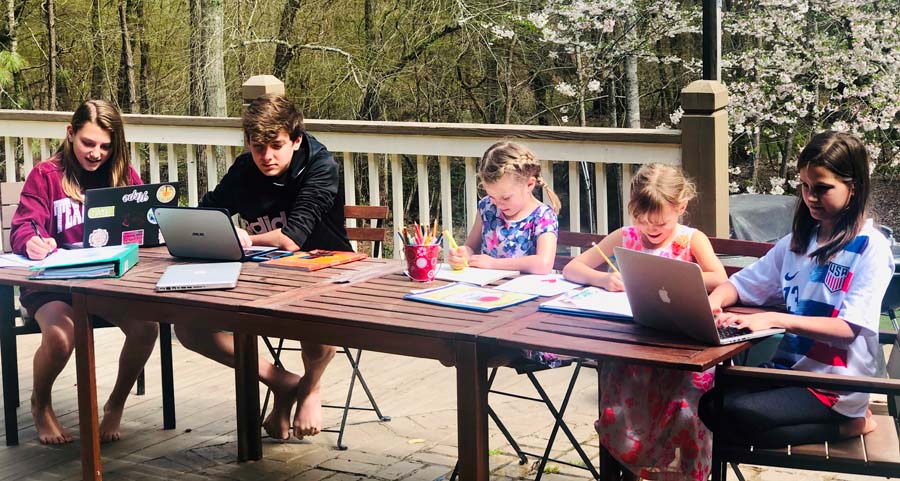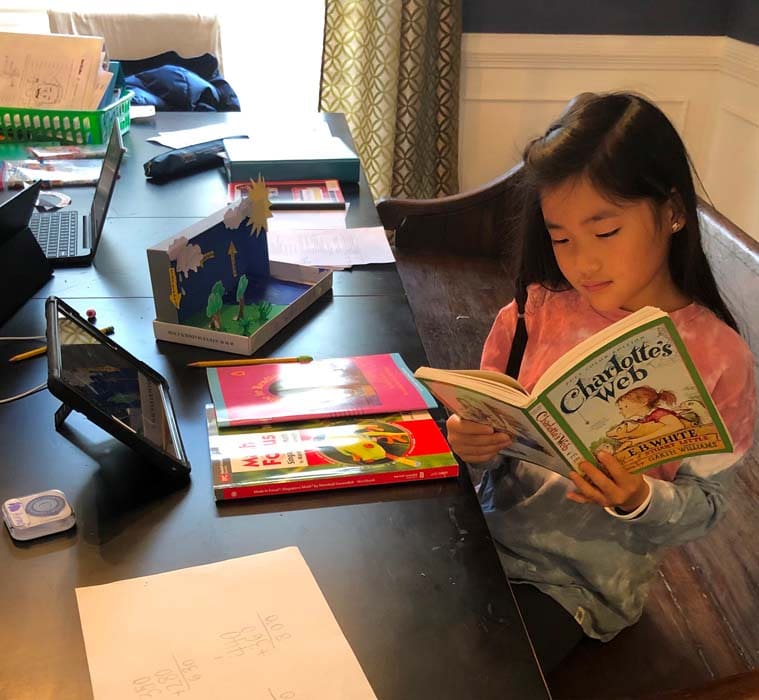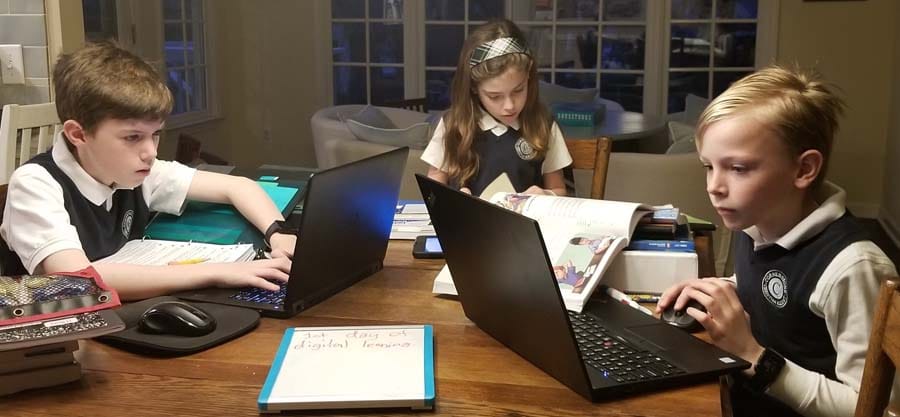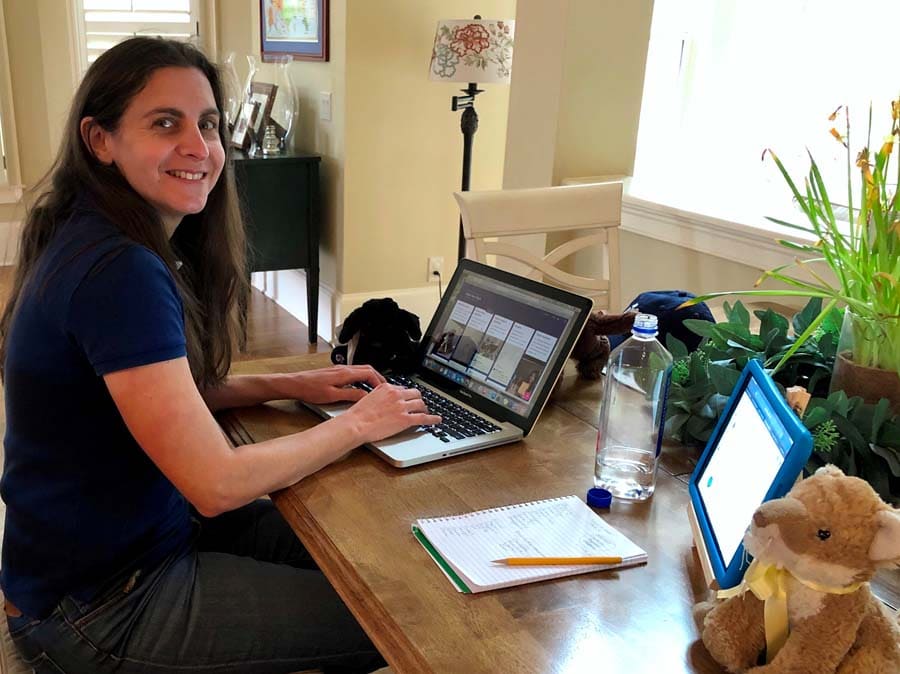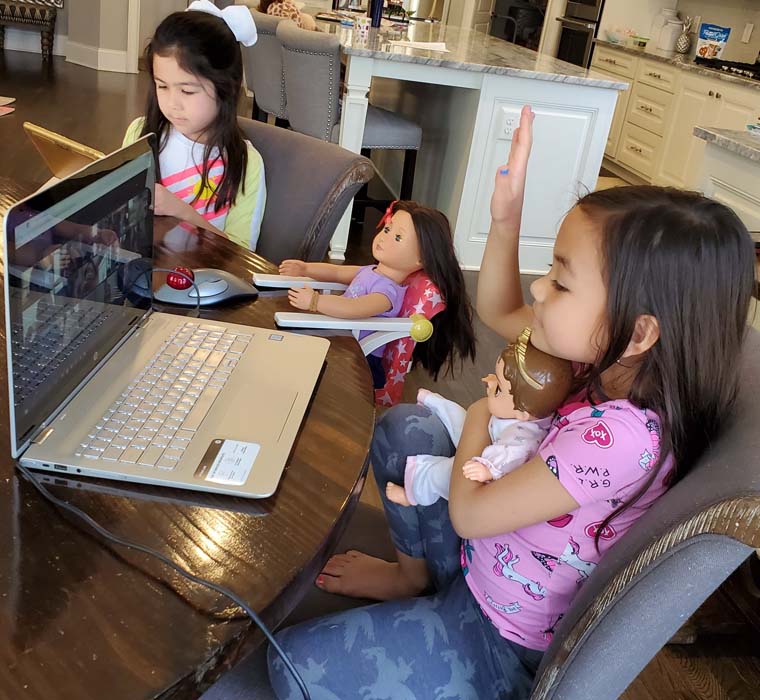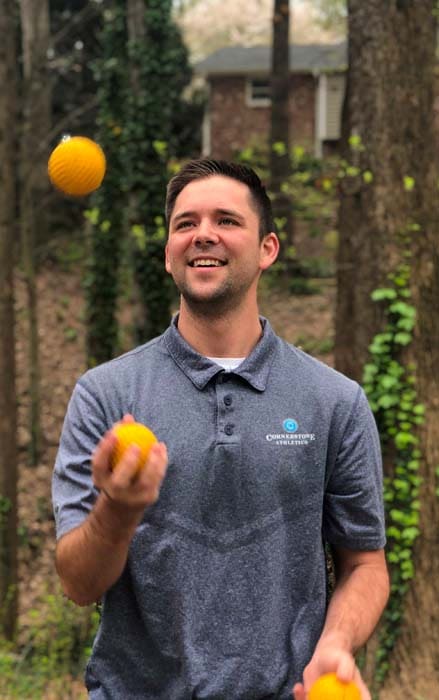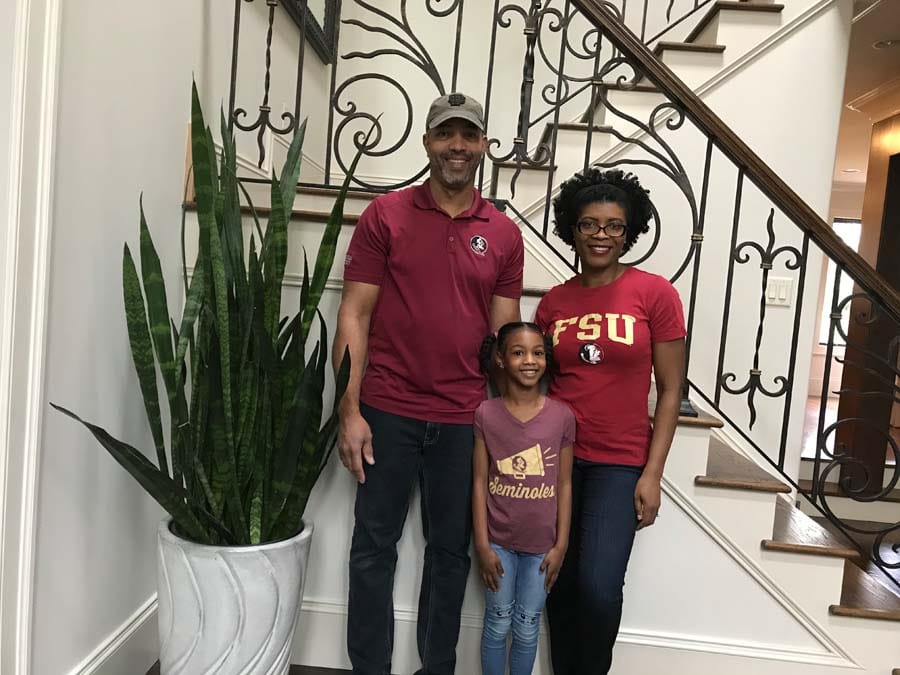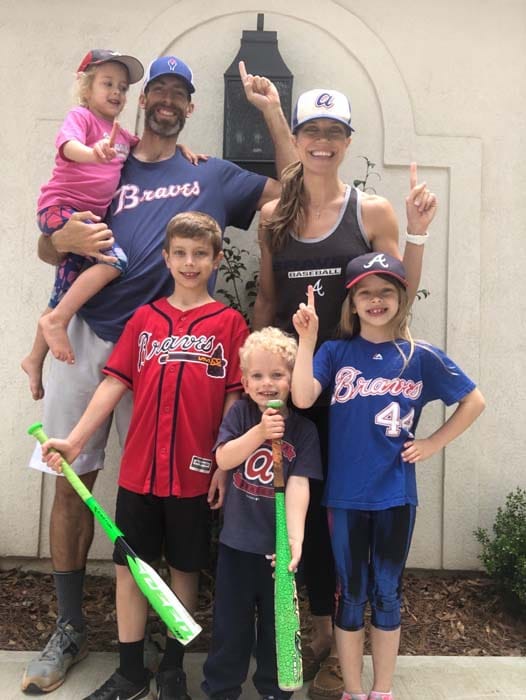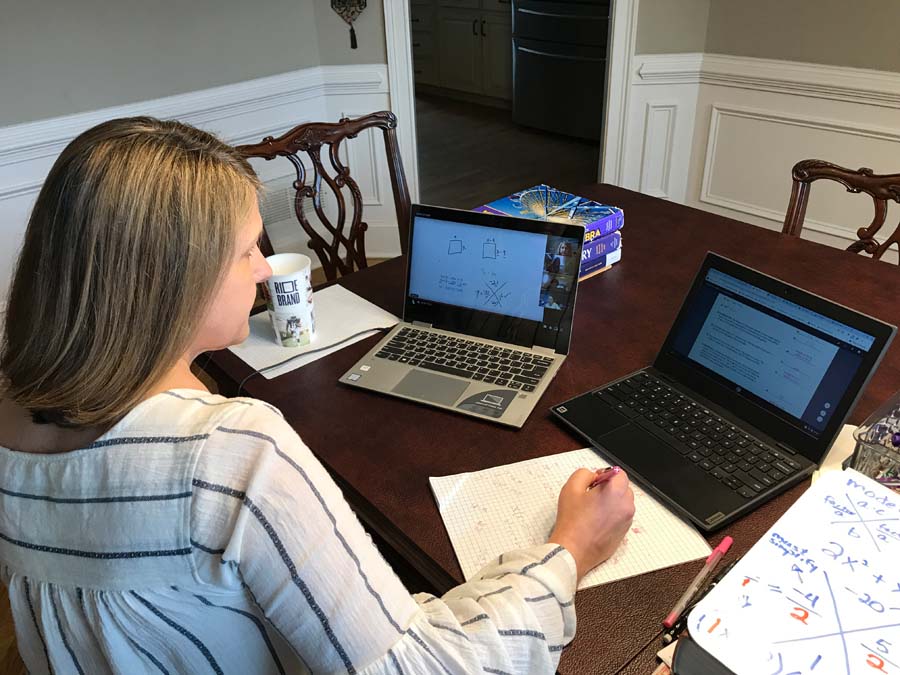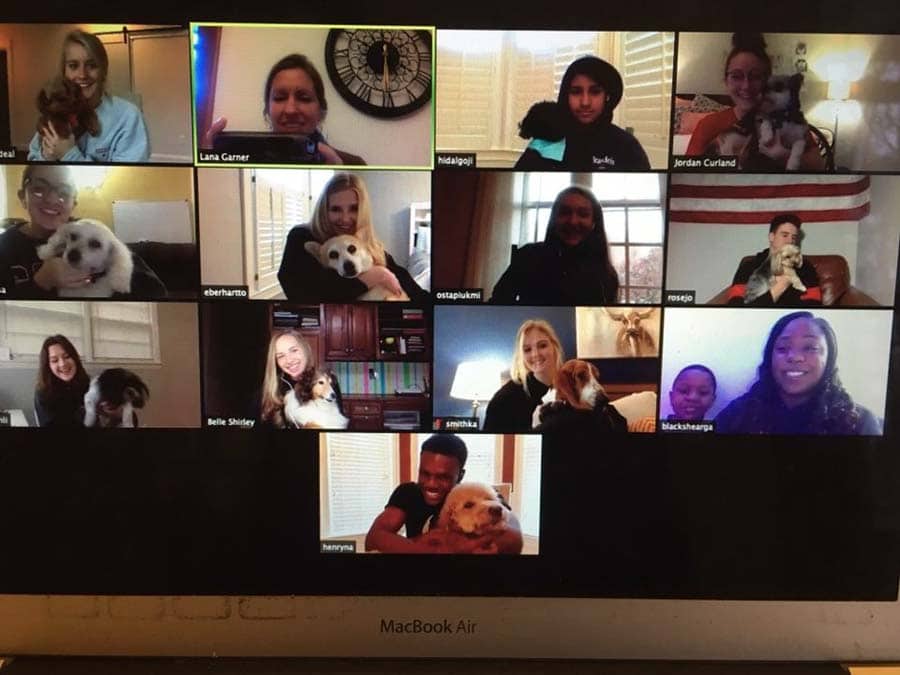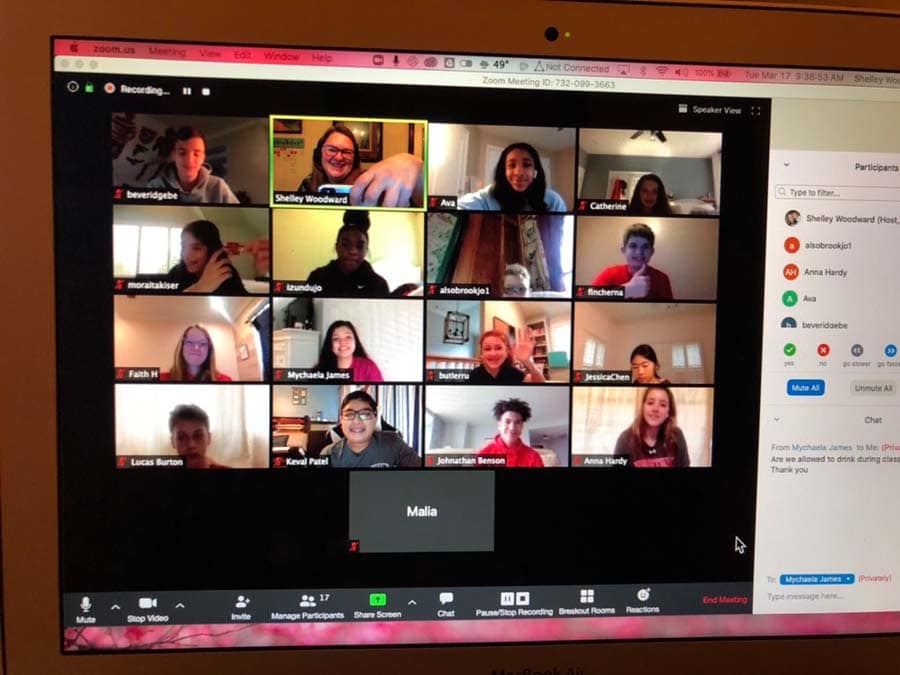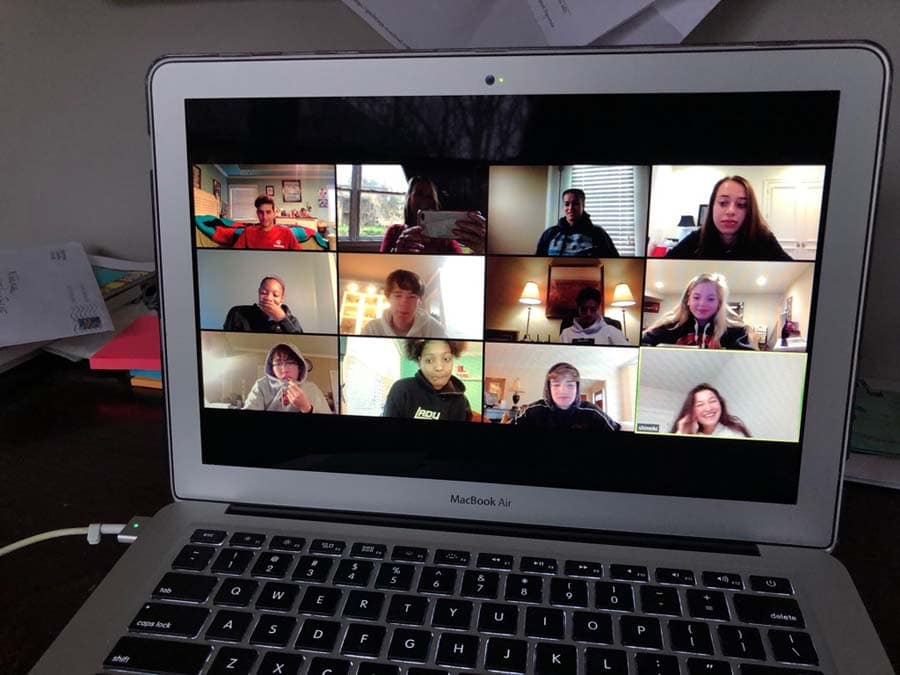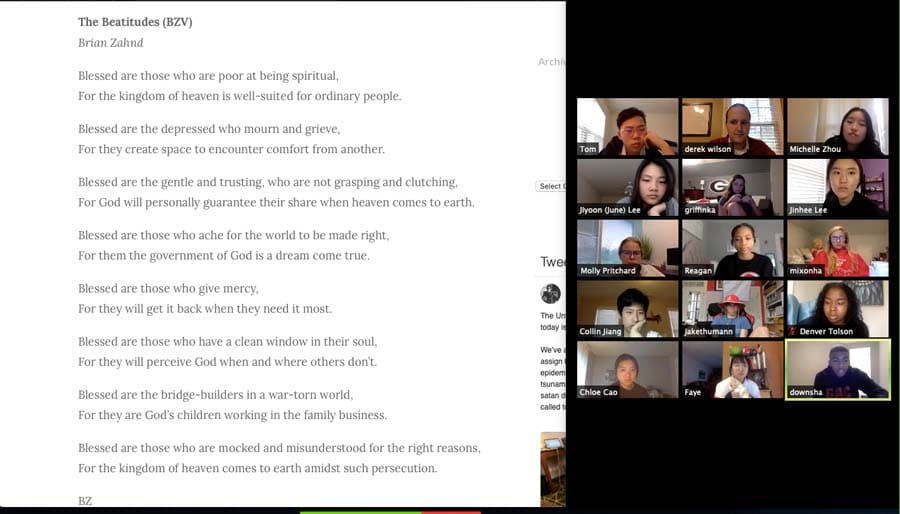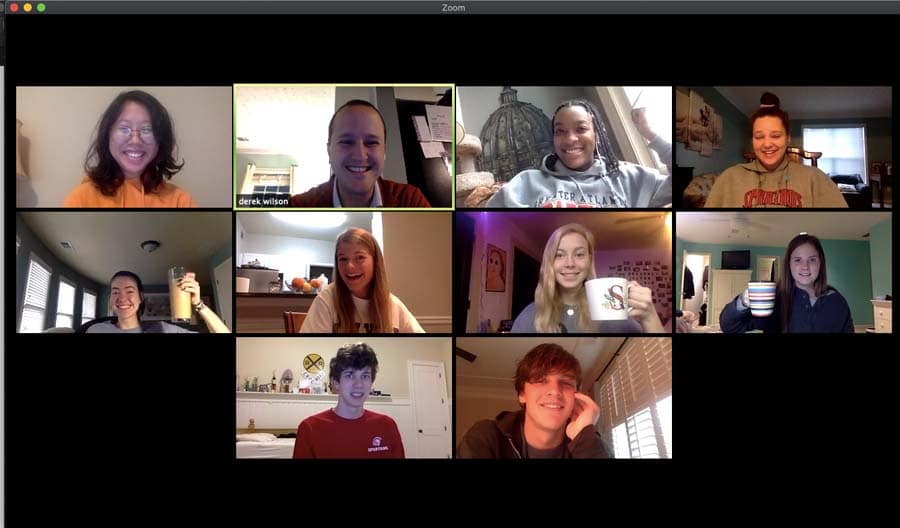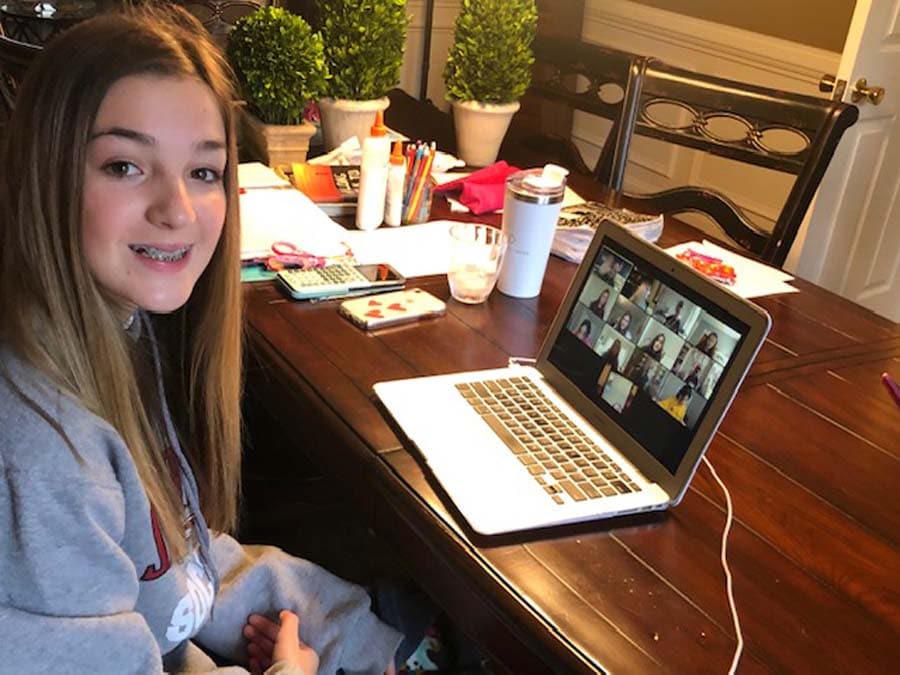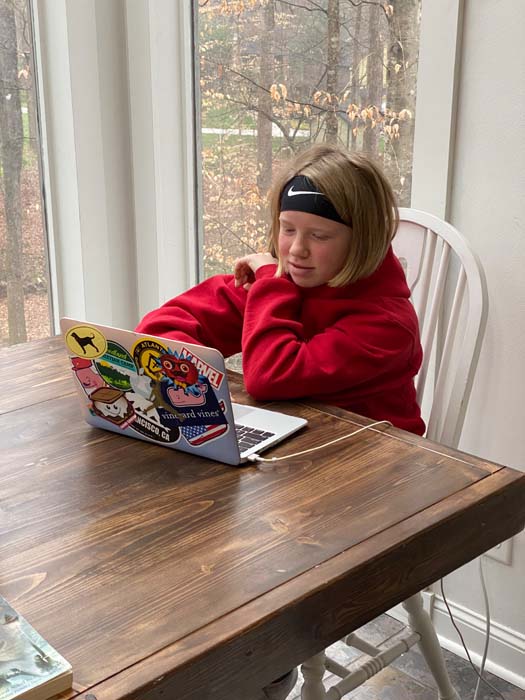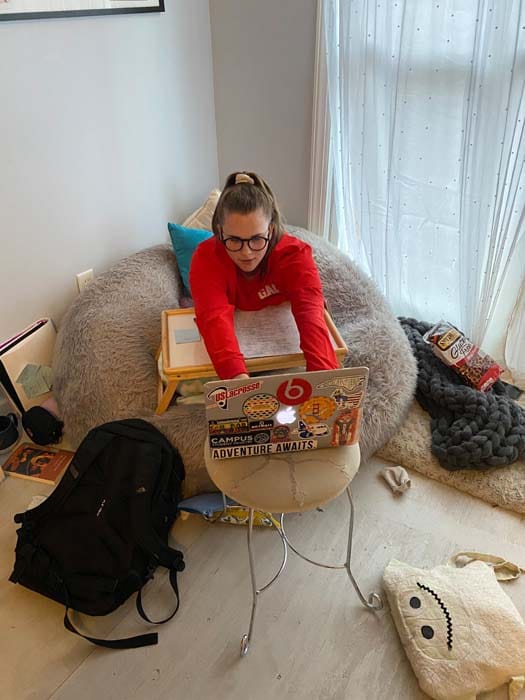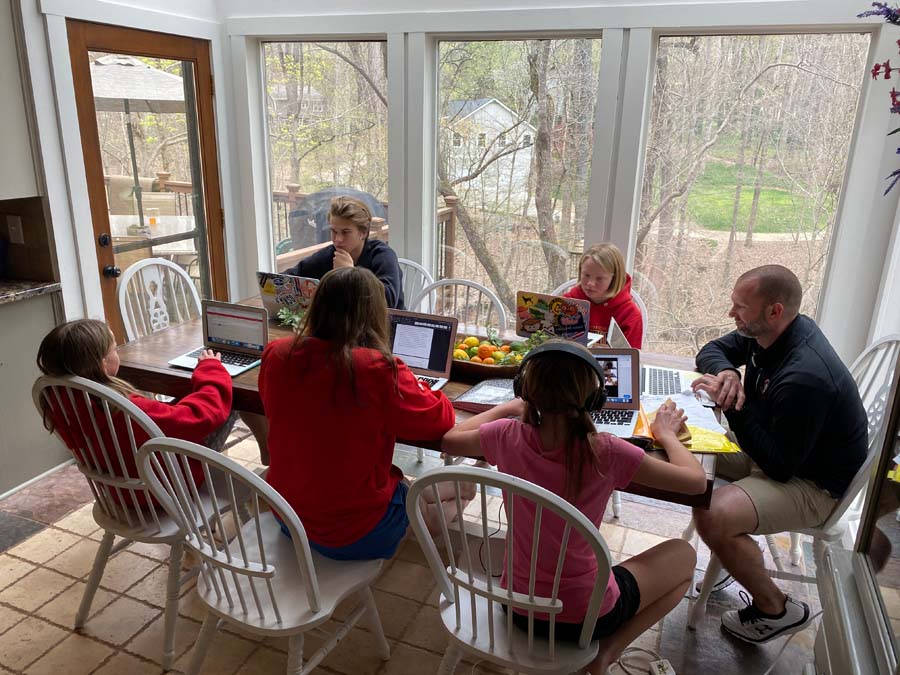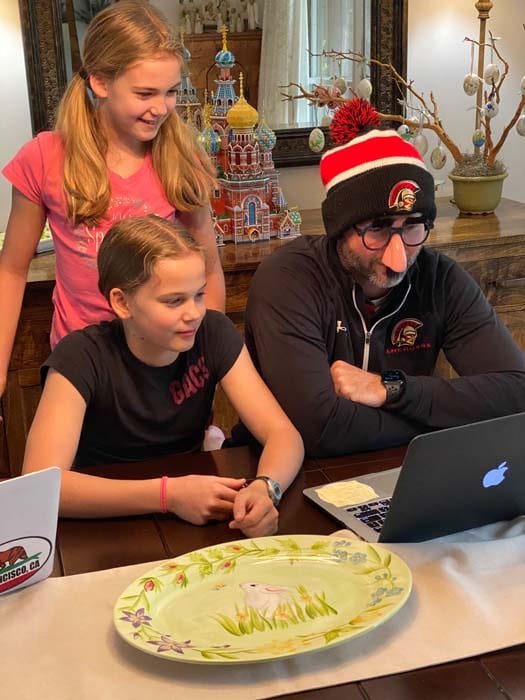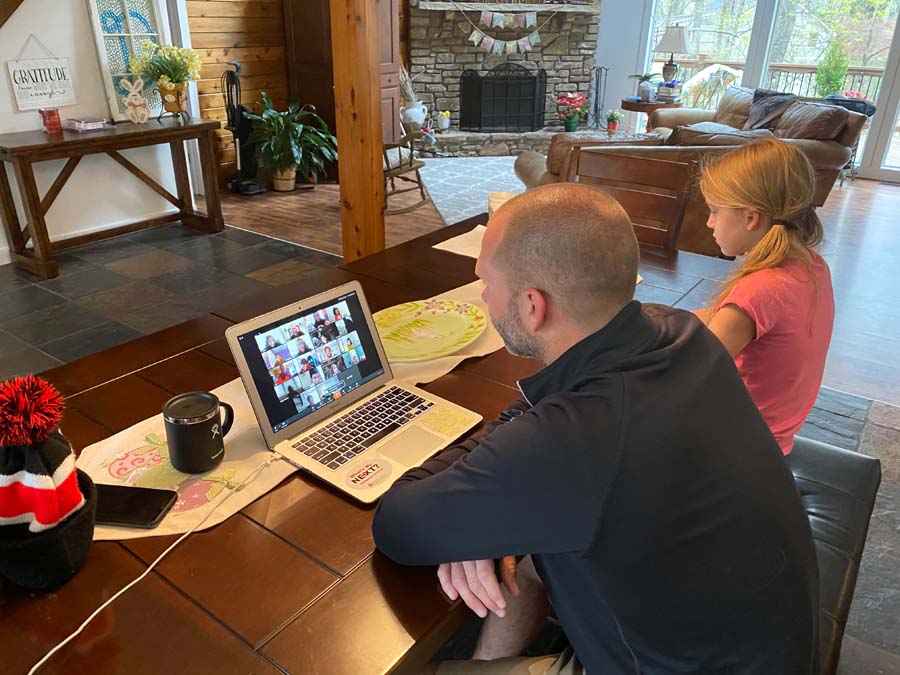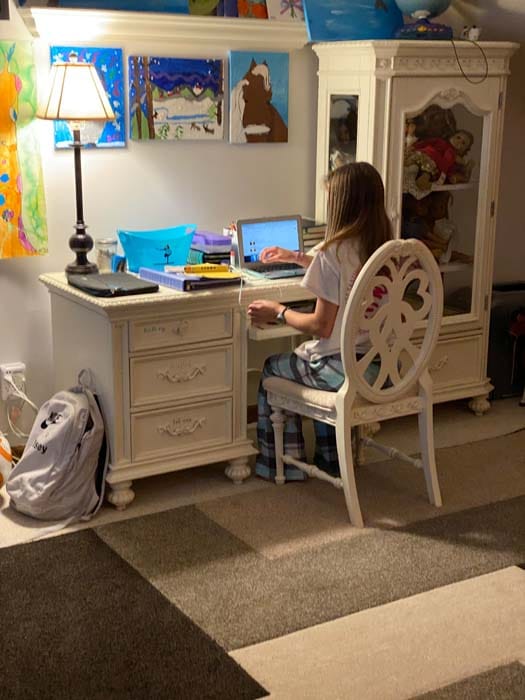Education
Local Schools Continue Serving through Crisis with Digital Learning
Published
4 years agoon
By
Kathy Dean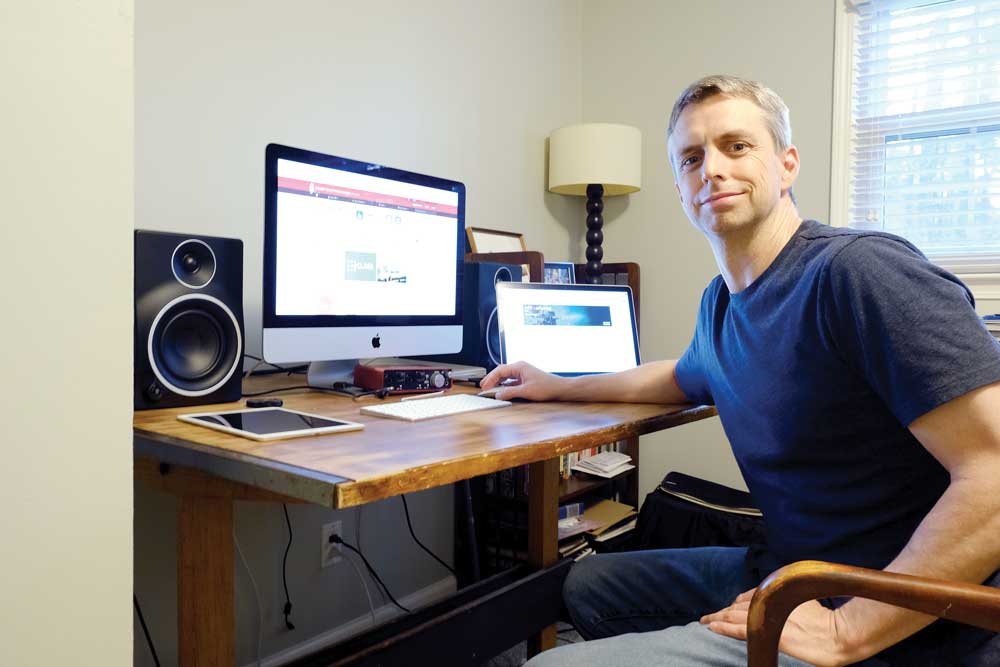
In an effort to stall the spread of COVID-19, most businesses and organizations have closed temporarily or curtailed their activities in some way. Many have found innovative ways to adapt and meet the needs of clients.
Few people would argue that schools across the nation — including Peachtree Corners area schools — have made the necessary changes quickly and efficiently. With short notice, they moved from classroom to digital learning.
Teachers are connecting online with their students while offering support to the parents working from home. Administrators and school support staff are making sure that teachers, pupils and parents get everything they need, and providing free, nutritious meals for students who need them.
Local schools, public and private, have found ways to keep students learning, families involved and everyone connected so they can weather the storm together.
Publisher’s Note: This article was written for the April/May issue and submitted March 31 for publication. Since then Gwinnett County Schools have moved to a 4-day school schedule which ends on May 20th.
Paul Duke STEM High School
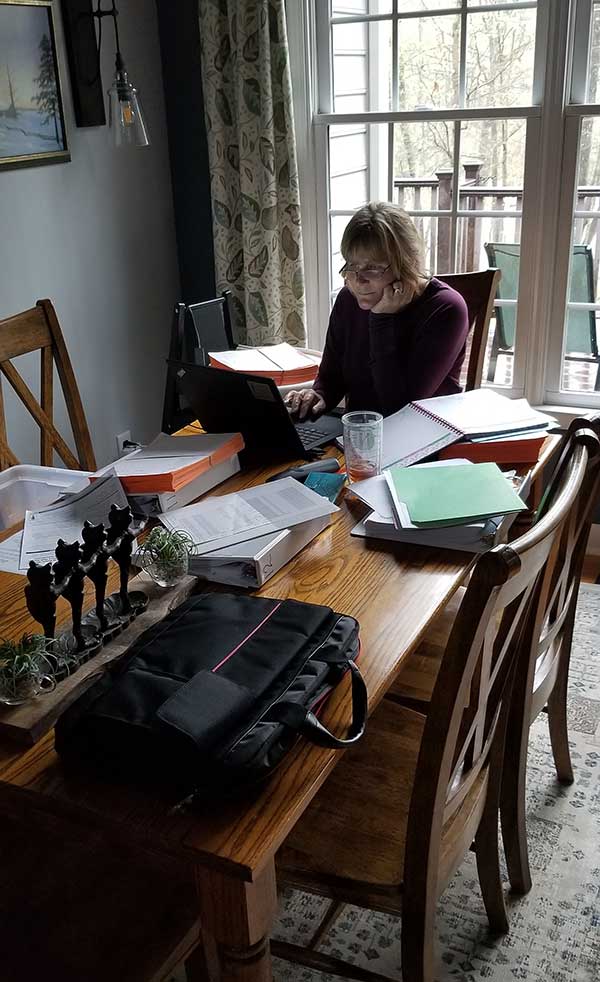
Credit: Candace McRae
Dr. Jonathon Wetherington, principal at Paul Duke STEM High School, explained that the teachers and staff are always prepared for Digital Learning Days as an emergency possibility. “As the COVID-19 concerns increased, we gradually began to ramp up our readiness the week prior to school moving to digital learning,” he said. “Given our regular digital learning on Fridays, we were well prepared for this experience, and I think we are getting better every day that goes by.”
He reported that the digital learning is going well. The students and teachers are highly engaged, he said, and students are checking in and continuing their learning every day. “We appreciate our parents pitching in and helping our students on a daily basis because we cannot be there for them like we are used to.”
Dr. Wetherington admitted that some students were reluctant to complete their assignments, so teachers and staff call to check on those individuals. “Also, our students are struggling — just like many of us — with the realities of our current situation, and we are reaching out more and more with phone calls and conference calls to provide some routine normalcy and support,” he said. “Our teachers love our students, and many of our students are worried about their future.”
For one of the weekly advisement lessons in March, the Gwinnett Student Leadership Team focused on helping the students learn how to handle their stress better. “Our students and teachers are truly amazing!” Dr. Wetherington said.
It’s just one example of the many Paul Duke STEM success stories. Another is the French teachers who were able to connect with their students to share musical moments with French songs. “I think our biggest successes are when we are able to connect with our students directly through a phone call or video lesson,” he said. “These human moments help sustain our digital efforts, and they remind our teachers and students that we teach students, not subjects.”
Schools belong to the communities they serve, Dr. Wetherington noted, and “at times like this, it is wonderful to lead such a caring and passionate group of teachers committed to our students’ success.” He added that he truly appreciates all the support that the parents and students have shown, as well.
“I say to the students often that ‘We are learning together to lead tomorrow,’” he continued. “I just never knew that tomorrow would come so soon, so I am grateful for how we are all learning together each and every day.”
Cornerstone Christian Academy
The Brown kids, left to right, Addison (6th grade), Noah (8th grade), Charlotte (Kindergarten), Harper (Kindergarten) and Annabelle (4th grade)Anna Chou (2nd) reading Charlotte’s Web The Creel kids, left to right, Cole (6th grade), Chloe (2nd grade) and Cooper (4th grade) First Grade teacher Maria Dausch online with her students Flook kids, Brooklyn (2nd grade) and Sayla (Kindergarten) with their dolls. Sayla is raising her hand to speak during a ZOOM class. McDonald juggling: Lower School P.E. Teacher Austin McDonald teaches students how to juggle, hoping to keep them active. Aarons: The Aarons family participated in Family Sports Day, held on March 27. Rawlings: The Rawlings family participated in Family Sports Day, held on March 27. ZOOM geometry & ZOOM lesson: Middle School Math Department Chair Terri Childers teaches a Geometry class to 8th graders using ZOOM.
“Cornerstone families: for those of you who have been around Cornerstone for a little while, you know me well enough to know that I desire to keep our doors open if at all possible. While digital learning is worthwhile, we all know it cannot replace face-to-face interaction.” This is how the first communication regarding the Coronavirus situation to the Cornerstone Christian Academy community began.
After rolling out digital learning plans, Headmaster Colin Creel closed with this: “I am so grateful for all of our staff and their willingness to do whatever is necessary to ensure that the integrity of our students’ education is not compromised. In addition, thank you to our parent community for supporting our efforts to achieve this goal. We are blessed beyond measure. Onward and upward!”
Under the leadership of school principals, Cornerstone implemented digital learning protocols on March 16. Parents were asked to pick up textbooks, journals, binders and other resources from the school.
Chromebooks were made available to students. Teaching teams collaborated to devise the best plan for close to 400 students in Kindergarten through Eighth Grade.
During the Coronavirus quarantine, students continue to check for uploaded assignment documents which include links to video and textbook resources, as well as online assessments. Middle School teachers are hosting live Zoom classes on a set schedule each morning and recording those classes for any student unable to attend.
Lower School teachers assign work through a nightly email to parents. Plans include detailed instructions for the students as well as links to several online resources including videos and activities.
Teachers are also keeping it personal with sweet daily welcome videos encouraging their students to have a great day. There are many opportunities for the teachers to assess their students’ work and provide support when it is needed.
In addition to daily required assignments, enrichment lessons and activities are provided. Physical Education (PE) videos keep the students active and have even included a fun video unit on juggling. The fine arts department is utilizing FaceTime to provide live piano and voice lessons.
In an effort to keep families connected, Cornerstone posts daily family challenges, jokes of the day submitted by students and dinner table topics on our digital learning parent resources page. Families especially have enjoyed submitting their video answers to the school’s Family Feud game. Everyone gathers, online, on Friday mornings to worship God together in Chapel; it’s a favorite part of each week for families.
Since they aren’t able to interact with the school community, non-teaching staff members have formed a Care Team, praying for families, writing notes of encouragement and making phone calls to see how to serve families.
A parent recently sent this note to Cornerstone: “Through our nine years at Cornerstone, we have been reminded again and again of something that was said to us by a parent when we first toured the school: “Cornerstone is like an extension of our family.” Never has that been truer than it is now. In this time of adversity, we are all sharing the same fears, uncertainty, challenges and disappointments, but we are facing them together offering each other the same encouragement, hope, faith and love that a family does during difficult times.”
Norcross High School
Principal William Bishop of Norcross High School said that NHS students and teachers have done an outstanding job moving over to learning and teaching digitally. This isn’t surprising, since the teachers have been growing their skills in using digital tools to teach students over many years.
“Our Norcross High School Foundation for Excellence has assisted the work in using digital tools by increasing the amount of technology that our students and teachers have access to at school,” he explained. “In the last few years, when we have been out of school for weather reasons, we have had Digital Learning Days, so this is not new to us.”
Still, Bishop added, learning digitally over a longer period of time is an adjustment for everyone. “In the past, if we are out of school two or three days, test dates or learning certain skills might be delayed until students returned to school,” he said. “As we look at the possibility of students learning digitally over a longer period of time, we have had to make a few adjustments in how we teach and how we assess student learning.”
One challenge the school faced was a handful of students who were not participating in some of the classes. The teachers and other staff members reached out to them and their families, and “we have made great progress in the participation of our students,” Bishop reported. That kind of focus on success is nothing new, he stressed, since NHS teachers and students are constantly making adjustments to ensure students are learning, whether in a classroom or online.
Digital Learning Days also brought an opportunity for some students to catch up on their classes. “Early in the semester, we had a few students who were behind in their work and needed to get caught up on their learning,” Bishop said. “With the support of their teachers, many of these students have not only learned new material online, they also caught up on the knowledge and skills they were missing before digital learning began.
“Our society values people who have knowledge and skills,” he continued. “It is key that our students continue to learn and grow whether it is in a traditional classroom or learning digitally.”
Greater Atlanta Christian School
GAC 8th Grader, Zoe Schlueter
When the school year went to digital learning due to the COVID-19 pandemic, Greater Atlanta Christian School (GAC) had a ready solution and pivoted to its online learning platform. Launched two years ago, GAC’s online Ethos School has been adapted to support the current need for digital learning for the school’s 1,600+ student body.
“Based on research and the demand for digital skills in the workplace, education systems are moving toward more online options,” said Director of Academics Dr. Betty Morris.
“Top tier colleges are leading the trend by offering higher educational degrees via an online platform.”
GAC was already educating more than 200 students across the globe through its Ethos School program before the current health crisis. Therefore, “our administration and highly-qualified teachers fully understood the online learning setting and were prepared to quickly transition the GAC educational experience into an online learning environment,” said High School Bible teacher Derek Wilson.
With modalities adapted to the age and needs of the students, GAC teachers are ensuring that learning continues and and that students and families feel supported during this challenging time. The response from parents and students has been overwhelmingly positive, for both the way in which GAC has supported students and families emotionally and also for the way in which students are adapting to the new learning environment.
With daily videos going out from its president, Dr. Scott Harsh, and frequent, uplifting messages going out through email and social media, GAC is making the most of the situation.
“Maybe the biggest difference-maker so far that I see is the tone of normalcy and excitement GAC has created for the kids during this time of online learning,” said parent Sandra Onal.
GAC students continue with their regular school day, with interactive instruction given in every class period. Teachers are using digital tools to fully engage students during class and are available to help before and after school as well.
Teachers are also finding creative ways to make class time fun and engaging. One teacher, Joann Waldrop, asked all of her students to bring their pets to class. Students are also scheduling lunch via Zoom together. The opportunities for connection are endless.
“There are many valuable lessons in all of this,” said Dr. Harsh. “Students are learning to adapt and make the most of the challenging circumstances. Even when so much has come to a halt, our students are continuing to learn, connect, laugh and grow, even though school looks different. An essential element for personal growth is adapting to change and learning resilience and I’m so very proud of the way our students are responding.”
Wesleyan School
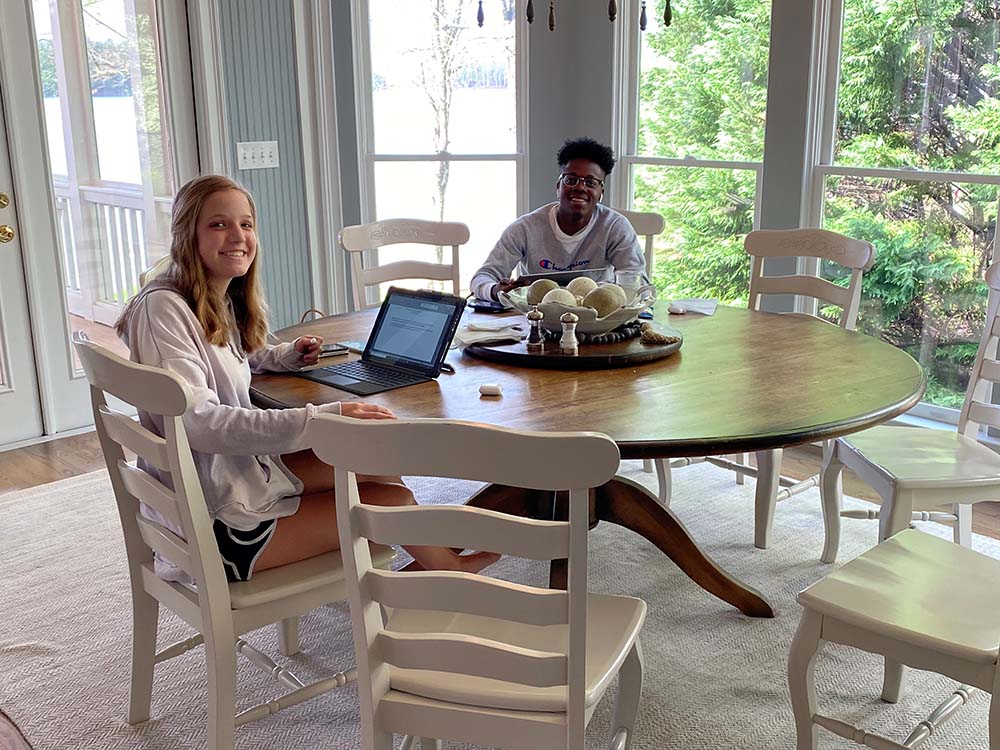
Wesleyan School was scheduled to begin Spring Break at noon on Friday, March 13. As the global and national reality evolved that week, the administration and academic leadership had approximately 48 hours before Spring Break to craft a plan, notify families of the shift to distance learning upon return from the break, and to train teachers.
During the break, the division principals, associate head of school, technology team and other administrators worked to prepare, and students began distance learning from home on March 25.
“While this certainly is an adjustment for everyone – students, parents and teachers – things seem to be going well,” said Wesleyan Associate Head of School Ramona Blankenship. “Our principals created a distance learning plan that started out gradually in terms of pace and workload. They did this intentionally to lay a strong foundation and to give families as much bandwidth as possible to adjust to this new normal of students and parents working from home together.”
Blankenship said that, overwhelmingly, the feedback has been positive as parents are sorting out how to oversee schoolwork from home while many are working remotely themselves.
Bethany Davidson, mother to Jamarcus, 12th grade, and Anslee, 9th grade, as well as two Wesleyan graduates, said she thinks the school did an exceptional job rolling out the distance learning model. “As a parent, I’m very grateful for all the hard work our administrators and faculty have done to help things go as smoothly as possible. It’s fun to be able to do things together that we don’t normally get to do, like have lunch on the porch.”
Davidson added that the family has decided that they enjoy this form of learning — with the exception of the social aspect. “That’s the hardest part — being disconnected from our Wesleyan community which is so very important to us!”
According to Wesleyan Lower School Dean of Counseling and Student Services Nancy Jones, one of the big challenges everyone is facing — not just schools or students — is managing emotional health during this time. “We believe that as a school, we are not just responsible for the academic well-being of our students, but also for their social and emotional well-being,” Jones said. “To that end, we are working hard to provide resources to families to support them as they navigate this unprecedented time.”
Counselors in each division — lower, middle and high school — have curated articles for parents on how to talk to their children about the pandemic and provided links to activities and resources for student use.
“Middle and high school have started a Weekly Wellness Guide that is sent directly to students each week,” Jones continued. “This includes a suggested daily schedule of activities students can do to clear their minds, relieve anxiety and stay healthy during this time of uncertainty. We are using Wesleyan’s digital platforms to provide check ins with students, and to provide light-hearted video moments for our whole Wesleyan community!”
Ninth grade student Anslee Davidson said that she’s enjoying the freedom to work at her own pace. “I finished before lunch today and then was able to work on my music and then enjoy some time out on the lake,” she said. “The biggest negative is not being with my friends and my teachers. I miss them all so much.”
GCPS Delivers Education and Nutrition to Students
As of March 16, Gwinnett County Public Schools (GCPS) has shifted to digital learning in response to the COVID-19 crisis. According to the GCPS website, “students and classroom teachers continue teaching and learning at home through Digital Learning Days.”
Teachers post assignments on their eCLASS C&I course pages during Digital Learning Days. Students use the MyeCLASS student portal to log in to their course pages where they access assignments, resources and other materials.
If a student does not have access to a computer or device, teachers can provide alternative ways to access assignments, such as email. Teachers may also support student learning through other means, including phone calls, discussion boards or online conference tools.
An important factor of successfully switching to Digital Learning Days is making sure students stay healthy by supplying meals to students. Many GCPS schools are providing lunch for pick up, from 11 a.m. to 1 p.m., for anyone 18 years of age or younger.
These lunches are provided at no cost to the individual through the federal School Nutrition Program. The student or child must be present to receive the meal; a child does not have to be a student at the school site to receive a meal.
Through the week of March 16-20, there were 138,371 meals provided to students: 23,004 at 68 school pick-up sites and 115,367 at bus stops.
“The number of students participating has grown since the first few Digital Learning Days. Our school nutrition and transportation teams have done a wonderful job continuing to make and deliver meals to our students,” said Norcross High School Principal William Bishop.
Schools in Peachtree Corners where meals are available include Berkeley Lake Elementary School, Peachtree Elementary School, Stripling Elementary School, Duluth Middle School, Pinckneyville Middle School, Summerour Middle School, Duluth High School, Norcross High School and Paul Duke STEM High School.
That’s not all. School buses deliver meals at bus stops in select clusters — Berkmar, Central Gwinnett, Discovery, Meadowcreek, Norcross, Shiloh and South Gwinnett — and for several schools, including Berkeley Lake Elementary School. The buses make stops at their regular bus stops between 11 a.m. and noon. To get a meal, the child must be at the stop when the bus arrives.
“In GCPS, we talk about the two types of employees who serve our community — those who teach and those who support those who teach,” the GCPS website says. “We are so proud of the hard work that both types of employees have done and will do in coming weeks to ensure that learning continues for Gwinnett schoolchildren, and that lunches are provided to children who need them.”
For the latest information on student meals and GCPS Digital Learning Days during the Coronavirus crisis, visit the GCPS website, gcpsk12.org.
Related
Contributing Editor Kathy Dean has been a writer and editor for over 20 years. Some of the publications she has contributed to are Atlanta Senior Life, Atlanta INtown, Transatlantic Journal and The Guide to Coweta and Fayette Counties.

Business
Gwinnett Principals Tour Businesses with Partnership Gwinnett for Workforce Development
Published
1 month agoon
June 19, 2024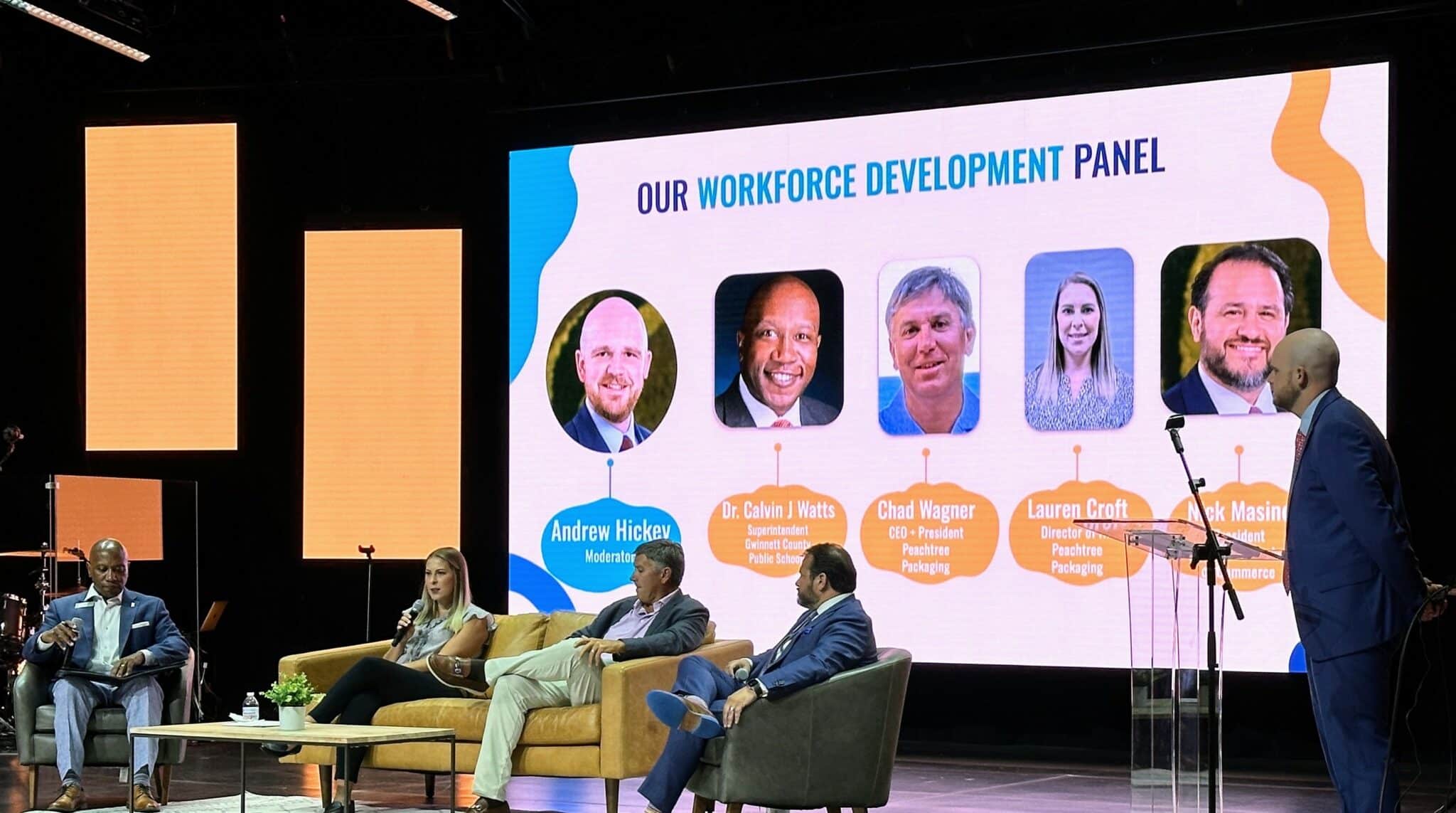
Partnership Gwinnett, in collaboration with Gwinnett County Public Schools (GCPS), recently hosted its annual Principal Field Trip event. The program aimed to connect professionals in education and industry to support continued workforce development based on existing and future needs.
The day began with breakfast and a panel discussion featuring Nick Masino, President & CEO of Partnership Gwinnett; Dr. Calvin J. Watts, Superintendent of Gwinnett County Public Schools; Chad Wagner, President of Peachtree Packaging; and Lauren Croft, HR Director at Peachtree Packaging.
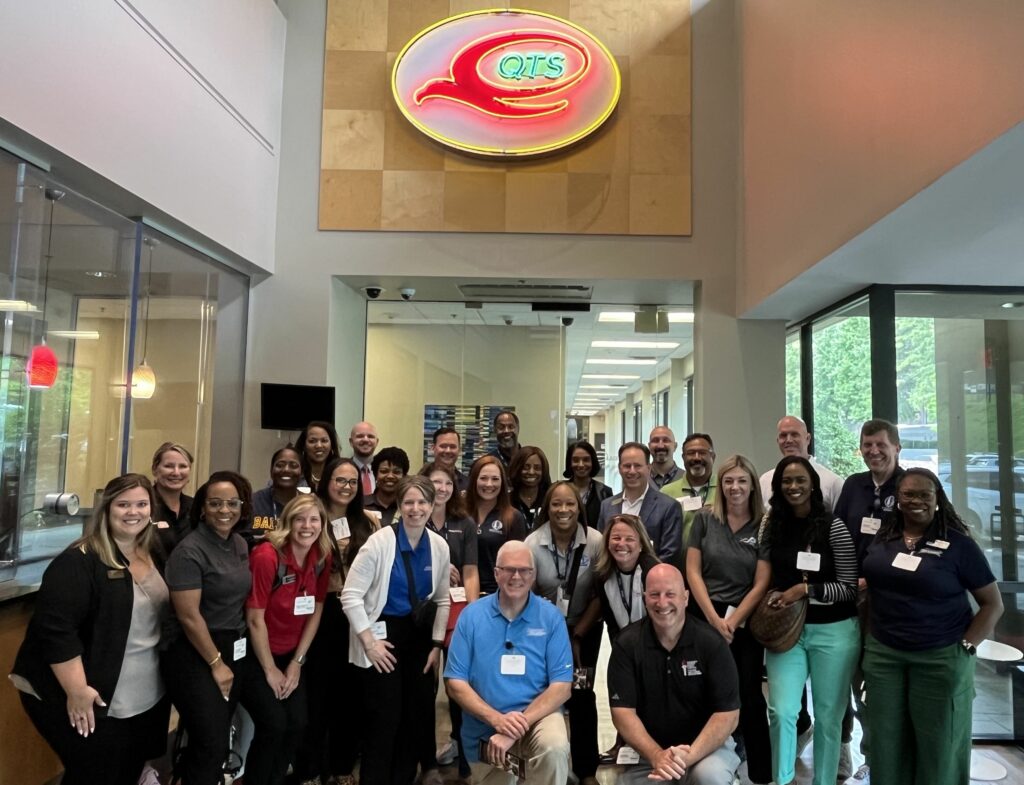
“Our principals and educators play a critical role in shaping the future workforce of Gwinnett County. This event provides an opportunity to bridge the gap between education and industry, ensuring our students are prepared and ready for high-skill and in-demand careers,” stated Dr. Watts.
In addition to having lunch at Gwinnett Technical College, principals visited several industry partners, including Price Industries, QTS, Peachtree Packaging, Mitsubishi Trane HVAC, Aluvision, CleanSpark, Nextran, WIKA and Eagle Rock Studios. These visits allowed educational leaders to engage with local businesses and understand industry needs.
“Supporting this event underscores our commitment to investing in the future of our workforce. By partnering with GCPS and Partnership Gwinnett, we can ensure that students are equipped with the skills necessary to thrive in today’s job market,” said Wagner.
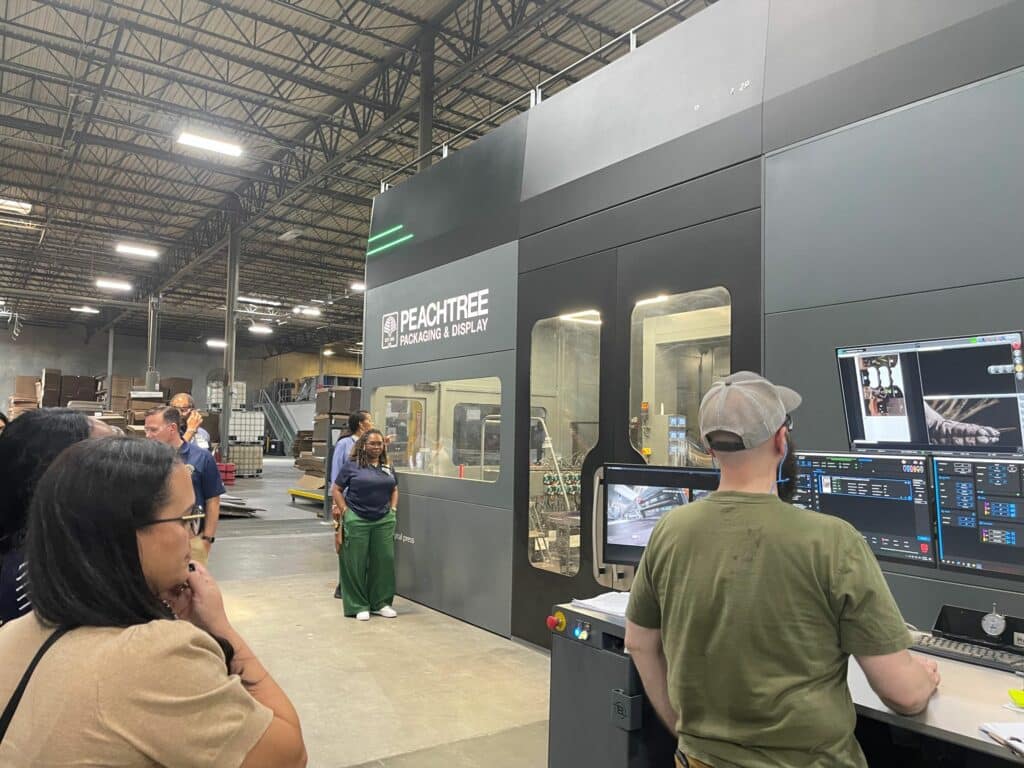
Gwinnett County Public Schools, the largest public school district in the state, serves approximately 182,000 students across 142 schools. The district’s diverse student population, representing 191 countries and speaking 98 different languages, benefits from career pathways and college and career readiness programs that support career exploration, industry certifications and internships.
“With thousands of students graduating each year, GCPS significantly contributes to the 2.6 million labor draw within a one-hour drive of Gwinnett County,” said Partnership Gwinnett Director of Economic Development Andrew Hickey. “As these graduates enter the workforce, they bring essential skills for high-skill and in-demand careers, ensuring a strong future for the local economy.”
Learn more about the work Partnership Gwinnett does here.
Related
Education
Steve Gasper, in the Run-Off for Gwinnett County School Board, District 3
Published
2 months agoon
June 6, 2024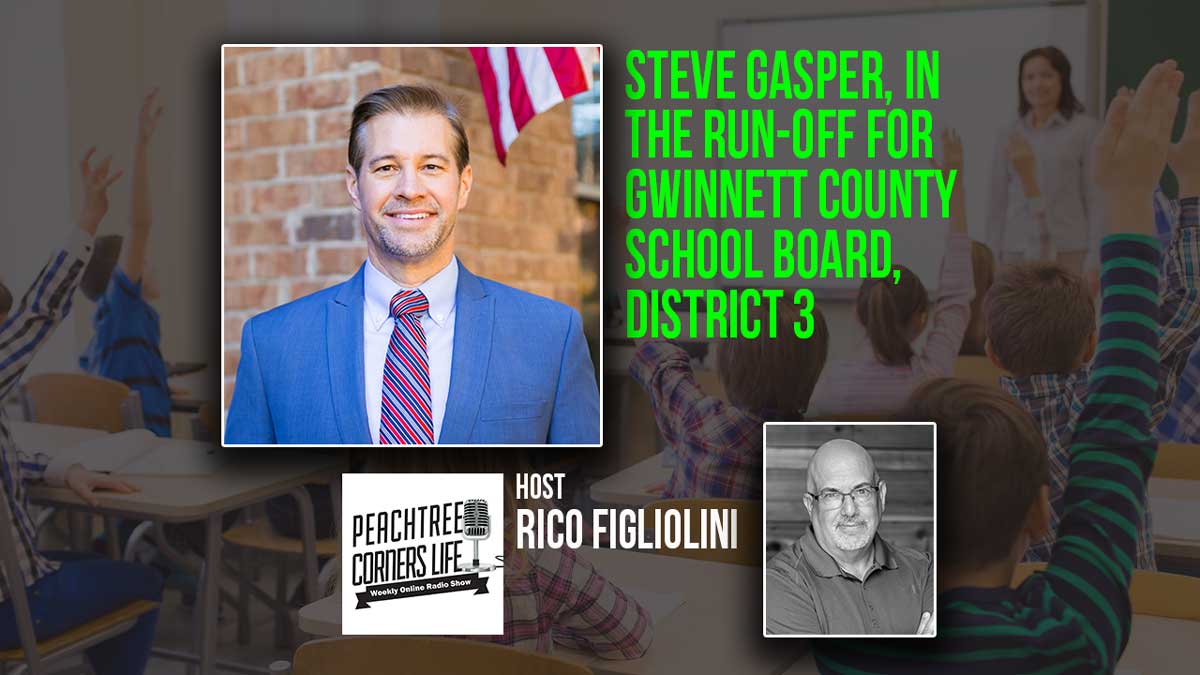
Gwinnett School Board Run-Off Election is June 18, 2024
Steve Gasper is a candidate for the Gwinnett County School Board runoff election on June 18th. As a parent with children in the Gwinnett County public school system, Gasper wants to maintain high-quality education while addressing policy changes. Steve highlights the importance of transparency, the challenges posed by technology, and the need to support and listen to teachers to improve morale and keep experienced educators in the classroom. With host Rico Figliolini
Resources: Steve’s Website: https://www.votestevegasper.com/
Timestamp:
00:00:00 – Steve Gasper: Candidate for Gwinnett County School Board
00:01:48 – Raising a Family, Serving the Community
00:03:53 – Qualities of an Effective School Board Candidate
00:08:44 – Balancing Discipline and Accountability in Schools
00:12:52 – Technology’s Impact on School Discipline and Safety
00:14:24 – The Impact of COVID-19 on Student Learning and Behavior
00:17:20 – Embracing AI in Education: Challenges and Opportunities
00:20:25 – Balancing Digital Learning and In-Person Education
00:23:10 – Improving Teacher Recruitment and Retention in Schools
00:26:39 – Balancing Parental Involvement and Inclusive Education
00:30:15 – Navigating Book Selection for Classrooms
00:33:56 – Collaborative Leadership for Gwinnett County Schools
Podcast Transcript
Rico Figliolini 0:00:01
Hi, everyone. This is Rico Figliollini, host of Peachtree Corners Life. I want to say thank you for joining us. This is a special podcast with one of the candidates running in the runoff for Gwinnett county school board, Steve Gasper. Hey, Steve, thanks for being with us.
Steve Gasper 0:00:16
Hey, Rico, how are you doing? Thank you for having me. This is a great pleasure.
Rico Figliolini 0:00:20
Yeah, no, no. It’s always good, love talking to candidates, hear their opinions, and just have a conversation about what they believe in and where they’re going. So this is a good thing. This is for school board district three, and the runoff is June 18. There’s some early voting going on, but I think that stops at a certain point. I forget when, but I’ll have that in the show notes, and you can share that with us at the end of the podcast. In the meantime, what I want to do is I want to be able to share that Steve and his wife Kelly live in Suwannee. They’ve been here in Suwannee since 2009, actually. They have twin kids that attend middle school, I think 8th grade, 8th graders.
Steve Gasper 0:01:00
Just graduated.
Rico Figliolini 0:01:01
Yep, just graduated. Cool. They’re going heading into high school. Good. They are freshmen, and Suwannee is great. Has some great schools up there as well. Of course, it varies in Gwinnett County a little bit, but in Gwinnett county is the largest county in the state and probably the largest school system because of that. So we’re going to have a lot to talk about. In the meantime, the first thing I’d like you to do, Steve, is just share with us a little bit who you are, why you’re running, and just give us a little background of that, a little taste of who you are.
Steve Gasper 0:01:34
Yeah. Happy to Rico. Thank you. So, of course, I’m Steve Gasper. I’m originally from deep in the valley of southern California. My whole family still lives out there. Attended the University of Southern California. I got a degree, bachelor of science in business administration, minor in marketing and management. And I have two beautiful. Now going now 9th grade twins, boy girl twins, super smart, super talented. My wife and I have been married for a long time, and we have two dogs and two cats at home. So we have a full house, if you could only imagine. Came to Gwinnett county, and I really came here for these, for our great schools. And the reason why I’m running for school board is I want to continue the great work that I’ve been doing over the last four years of being so involved in the school system. And I know we’ll probably touch on some of that later, but that’s really the main reason, is to just keep the good work going and really keep our schools great.
Rico Figliolini 0:02:34
So Gwinnett county has, over the last two to four years, has changed. The board makeup has changed a bit, bringing a little bit more diversity to the board, a little bit different perspective also from different people. Things have changed with regard to disciplinary in the schools as well. And, you know, and, you know, my kids have been through the school system, public school system as well, all three of them, from elementary, middle school, and high school. Even a stem, stem school at Paul Duke here in PC.
Steve Gasper 0:03:09
Absolutely.
Rico Figliolini 0:03:11
Yeah. It’s just a phenomenal school. Norcross high school, also great. My kids went through the other two, went through the IB program there, made them better students. It was a harder course to go through a lot of writing, but I think things have changed since then, even simple things like cursive writing. It’s not taught anymore.
Steve Gasper 0:03:34
Right, right.
Rico Figliolini 0:03:35
Sorry. I don’t even know how people can give you a signature if they can’t do cursive, but that’s besides the point.
Steve Gasper 0:03:42
Signing a check. Right, Rico?
Rico Figliolini 0:03:44
Can’t do that. Can’t do that, apparently, without the cursive. Right, right. So, but, so because the board has changed, because the policies have changed, what do you think makes for a good board candidate? You know, running for this? A tough job. It’s part time, doesn’t pay well. So what’s. Who’s the right person for this job?
Steve Gasper 0:04:05
Yeah. No, you hit it right on the head, Rico. It is a. It is a tough job. It is. It is one of these jobs that you are on the ground floor of everything going on in Gwinnett county. I look at our schools as one. As one of. One of the main pillars of any. Any community. With. With great schools come great business opportunity, come great growth in the community. You know, comes housing, great house, great home values. People want to move into the community, and so it really is a true. A true pillar of our community, and we have to. We have to hire board members that. That really touch on many different experiences in life. And I like to look at my experience of being a former classroom teacher to being a small business owner, and all the way up to the last 23 plus years in the corporate space, mentoring, hiring, training, coaching people from all walks of life, and then to kind of top all that off, just being heavily involved in the community over the last four years with regards to our schools, speaking at school board meetings, participating in district committees, from the superintendent transition committee, to the discipline action committee, to the Instructional Resources Review committee to speaking at school board meetings on behalf of parents and some teachers who are afraid to speak up and in fear of retaliation. So bringing all that together, I think, I’d like to think I checked the most boxes in terms of bringing a diverse idea of qualifications to this position and to the seat. And, you know, having all of that helps because we are. This is. The school is essentially a business. It is a. Our 183,000 students, 22 or so thousand staff, teachers, and those that support, those that teach. You really have to understand how not only education and what the needs of our teachers are, but also what the needs of the business as a whole, in the school system as a whole, is $3.2 billion budget, and we have to be able to manage it effectively.
Rico Figliolini 0:06:17
It’s interesting the way you said that before, earlier, you said about hiring, you hire your board members in a way that is the case.
Steve Gasper 0:06:24
Right.
Rico Figliolini 0:06:25
Because people have. You’re going through an interview process. The grueling campaign is really an interview process. It is. Right. And if you get pulled up for a second interview, which is what this runoff is, if we can make that comparison, then there’s more. More questions that come at you.
Steve Gasper 0:06:43
Absolutely.
Rico Figliolini 0:06:44
You talked about the big budgets. Should it be treated as a business? It certainly needs to be treated with responsibility. You have to be good steward of the money. You have to know where it’s going. That’s right. And some people say there’s not enough transparency in the school board that they don’t share. Not only. I mean, the budgets they may share, but also the statistics of what’s going on, the turnover rate of all that. Do you feel the same way about that, about transparency in this?
Steve Gasper 0:07:16
I do. And I think a lot of that comes from just the involvement that I have had in the schools over the last four years, from meeting with the former superintendent to the current superintendent to other senior district leadership. And, you know, looking at the data that has been presented to us as community members, as you know me, I’m a parent, an outsider for the time being, and not privy to any additional information that the school board members might be privy to behind the scenes and looking. Transparency is hugely important. It’s one of my platform pieces on my campaign is transparency and fiscal accountability. And like you said, this is almost an interview process. I’m being hired for a job, and the voters are gonna select the best candidate for this position based on what we stand for and the voters in it, that in return, we have to give them the pleasure of what is going on in our schools. We have to be transparent with where the money’s being spent, how it’s being spent, and we also have to provide the data to the community that they can work with and not feel that data is missing or these numbers are being cushioned or protected. And if that’s, that’s what we need to do better at. And that’s. That’s my, that’s my commitment.
Rico Figliolini 0:08:37
When it comes to discipline challenges over the past few years, right. If it’s an incident, but it’s not reported to the outside, it’s not considered in the data that’s released from the school, apparently. Well, at least that’s what I understand. Unless you see it on next door somewhere. There’s always questions of people saying, did you hear about the fight that happened at the school? Or things going on? My son works in technology park, for example, and he’ll see four or five kids just hanging out in the woods behind their office, which is literally next door to Norcross high school. So he’ll see kids out there like that know they’re not doing anything bad, per se, but they’re not in school, obviously. And then there’s disciplinary stuff. So I know it’s changed over the past couple of years, but what do you see necessary? What are steps that are necessary in your mind that relates to that, that the board’s not doing, that they should be doing?
Steve Gasper 0:09:38
Yeah, we. I go back to a couple years ago, summer of 2021, when the superintendent and the board had rolled out this new restorative justice discipline process. And we quickly, not only as parents, but as teachers and even some board members and community, realize that this was not the right time to roll this out. There was an effective training. It essentially took away the disciplinary tasks at the school level and put them up at a cluster. But I like to call, like, a regional perspective, which I think that’s not effective because the principals, the teachers, and the local administrators at each individual school know their schools the best. They know their students the best, they know their teachers the best. That needs to remain at the schools. And so for me, it’s important to have a good, structured discipline policy, but there also needs to be room for teachable moments. And our k through twelve kids, they’re constantly learning. They look to adults for affirmation, for support. And if we’re just disciplined kids, sending them away, sending them in suspension, and at least not letting them understand what it is they’ve done wrong, then we’re not succeeding as a school system. So I do believe in consequences for actions. Just like if you and I walked out on the street and I got in a fight or I punched somebody, I would be arrested for assault. That students should understand that actions have consequences, and we need to do better at helping our students understand what they did wrong, but also holding them accountable for their actions and not being repeat offenders. And for me, a great example is South Gwinnett High School. I look at the new principal that came into South Gwinnett a couple years back, and. And year over year, discipline referrals are down over 75%. And that is data that I presented at the last school board meeting. When I spoke to the school board and the superintendent, and you know how they’re doing that. They. The super. The principal was kind of no nonsense. He came on and said, hey, if you’re going to. If you’re going to break our rules, we’re going to hold you accountable, and it’s going on your record. And they have put teachers and administrators in the hallways in between classes and periods. That way, there’s more eyes and ears as to what’s going on. So it’s leading me to believe that it’s. The students are going to be less inclined to get into any sort of mischief, whether it’s in a bathroom or in an unobserved hallway or corner. That’s what we need to really improve upon. I know the school board is looking to reintroduce this program, and. And I know they’ve gone through a long and extensive training process, and I. It’s my hope that this is an effective program, and. And I’m going to make sure that it is, personally.
Rico Figliolini 0:12:42
All right, sounds good. You know, with that comes challenges. Obviously, technology can be part of that challenge, right? Phones in the hands of kids, social media, to some extent. You know, everyone wants to be a content producer, so that. Just videoing, whatever happens. And, you know, if Joe Smith decides to be disruptive in a classroom, there’s a video right there. It’s going to be posted later, maybe. Do you see that technology, you know, in some schools, in some. In some countries, and in some places, phones are not allowed in the school, or they are locked or they are put in place. That’s not, like, in their hands in the class, right? I mean, do you see things like that happening? I mean, I think was the state of Georgia. You have to be 16 and older to be able to be on social media. I think Kemp cited that into law, if I remember correctly, although that’s easy to say, but that’s difficult to implement. It’s impossible to implement, actually. But how do you say technology with regard to discipline, with regard to these types of challenges? Done. Both public safety, the money that’s going to each school for public safety, there was also another grant from Governor Kemp to. It was 45,000 to every school in the state. So. Yeah. So talk about technology, safety, discipline. Give me something.
Steve Gasper 0:14:09
Yeah. And to your. To your point, Rico, just over the past several years, and really, a lot of this has come out of post Covid, and you have to take a step back and kind of think about maybe why this is coming into play. And our kids were truly traumatized during COVID We went from in person learning to complete lockdown. Schools were all digital. Kids were at home trying to learn on this new, unfamiliar platform or way of learning. I saw my kids personally struggle from digital learning. But on a different note, you know, not knowing what the home life situation is for our other kids, it’s. They could. They. They may not be from the nuclear family home. They could be from. From broken households. And. And, you know, I’m certainly sensitive to that. And I saw it when I was. When I was a teacher and had a deal with students that that came from broken households or single parent homes or a non parent home, a grandma, grandpa, and uncle taken care of, or.
Rico Figliolini 0:15:09
Even two parent homes where they’re working hourly jobs. Yes. Home when the kids get home. Right.
Steve Gasper 0:15:15
Yeah, that’s a perfect example as well. And that’s where my wife, too. My wife and I both worked. Even through Covid, our companies found ways for us to work. And so it was hard to just be present with our kids, helping them do digital learning. And we knew that we needed to give them an option for in person instruction. But kind of back to your original question. It’s technology is great and powerful, but it’s also has created a platform for students to videotape discipline. Incidences in the schools, fights, kids setting fires in the bathrooms, kids talking back to teachers, yelling at teachers. And that, to me, poses more of a dangerous situation than we really need to have involved in our schools. And so I believe that it’s good that my kids, I know through junior high they couldn’t take their phones out of their backpacks. They had the few times during the day where they can check their messages, but they couldn’t use their phones. And they had computers. They have chromebooks that they can access technology through. But I think that we need to at least give our kids an opportunity to learn in the classroom. And there’s different. There’s other times of the day for social media, for interacting with their friends, for being online, quote unquote. But really the main focus is getting a quality education, being present in the classroom, helping our teachers teach all of our kids equally and not be a distraction. And these are things that are important to me.
Rico Figliolini 0:16:51
Staying with technology a little bit. High school level or STEM? Stem level. Lots of schools. I know there’s a elementary school here locally that wants to start. They’re doing the three year process to become a STEM elementary school, for example. The technology is important, right. AI as, even with chat GPT 4.0, which isn’t, I mean, I use it still not obviously where people saying it is, but you can still do certain things on it and it will continue to grow and change over the next year. These kids are going to be using it in college because at some point, even colleges have to accept that AI will be used in the school system, in the classrooms for a variety of things. How are you looking at that? How. It’s a challenge for private and public schools. Right? How are you looking at that? Where’s your viewpoint on that? Where would you like to see that go?
Steve Gasper 0:17:45
Yeah. For me, my belief is, obviously it’s here to stay. It’s inevitable. We know that AI is something that we as adults see on a daily basis, and our kids are being exposed to it through, through social media, and we have to embrace it. That’s, that’s really, that’s really it. We can’t, we can’t not live without it. We can’t not deal or, you know, operate without it. We know, you know, students, like you said, are using, you know, chat GPT. And, and we also know that, that teachers are, are also, you know, following up and using their own chat software to, to at least make sure their students understand what it is they’re doing and not just getting something written just because they want to turn it in for a grade. But I think that, and we’re seeing that happening, too. And our kids are very, very smart. Our students are extremely computer literate. My kids are a lot smarter on technology than a lot of my family members are, including some instances with me, too. But it’s important to embrace that this is our future. This is what they need to have to function.
Rico Figliolini 0:18:59
Does the school, and I don’t know this, but does the school system have a task force that’s dealing with this to be forward thinking about policy, how high school kids may be using it on paper or how the school system itself, how teachers can use it in a way because it’s being implemented through different companies, different industries. So is there an active development of looking at how things can work in this? Is that something that you think is worth funding? Because money has to come from somewhere.
Steve Gasper 0:19:34
I guess it does have to come from somewhere. No. And I know there is. They are actively researching this. They’re actively finding ways that this can be beneficial to our schools. We have a really good IT department. In fact, the school board just approved about 21 and a half million dollars in funding for the IT services for this coming school year. And so a lot of money is being given to that area. And I think, you know, we need to really focus on how we can use it in a beneficial way. Part of the IT team right now is trying to figure out how we can keep our kids off of malicious and salacious websites while in the school buildings or, you know, even on the school chromebooks. How do we figure out how to keep kids from. From watching the NCAA final four basketball tournament in the middle of the classroom, or gambling or playing poker or blackjack? You know, these are things that we need to resolve these issues. And. And I do know for a fact that the IT team is, is implementing some. Some changes in the upcoming school year that’s going to help help offset some of that, as well as bring AI into the end of the mix.
Rico Figliolini 0:20:48
Do you think digital learning days are. My kids went through, my youngest actually went through digital learning on Fridays. So four days in one day, remote, he was fine with it. He one of the few kids, I guess, that could do it and met deadlines and stuff. When they first implemented, it wasn’t that way. They had to keep sending out emails every Sunday night to make sure kids did their work and stuff.
Steve Gasper 0:21:15
Right.
Rico Figliolini 0:21:16
But it also, in a world where half the people or more are working, hybrid or remote, it almost makes sense to allow that sort of flexibility in there. Maybe. But do you see that as something that should be done across the school system and not just at certain schools? I don’t even know if it’s done at all schools, but, yeah.
Steve Gasper 0:21:38
So the GCPS calendar does implement digital learning days across the entire system. So all schools do participate in digital learning days. And I think there are reasons why they do it. A lot of them are teacher days. Just like you said, students can find some time, study on their own to learn on their own. And it’s not a whole lot of them that are on the calendar. But to your point, we are a society where I was in a hybrid work environment for a couple of years out of COVID And I know a lot of organizations are just now getting back to requiring employees to be back in office. So I think it’s a very delicate balance that we have to, that we have to walk with our, with our students, with, with especially the younger students, the elementary grades.
Rico Figliolini 0:22:37
Sure.
Steve Gasper 0:22:37
Because those are the ones that, that if it’s, if it’s not in person with a teacher and, and they don’t have someone at home to help direct them, like you said, it’s, it may not get done that day, and then they come into school the following day and they’re, they’re slightly behind. And what is that? What does that turn into?
Rico Figliolini 0:22:56
Right. And I totally agree with you. I think elementary school needs to be handled differently anyway, in some ways. Less on the testing and more on actually bringing up young people to understand the world and to be able to take responsibility and things. But that’s the way I feel about it. Invest more time in those five years and you will have a better student coming into middle school and then high school.
Steve Gasper 0:23:20
That’s correct. Yep.
Rico Figliolini 0:23:21
But you do need teachers. So that’s the other thing. Right? Teacher recruitment, retention, morale over the last several years has been a little low. Burnout rate. Teachers work in the public school system, all of a sudden decide, I’m done with that, I’m going to the private school system because it’s more money. It’s a little different. So how does the county, how can the county compete to recruit and then to retain those teachers? What are your thoughts on that?
Steve Gasper 0:23:52
Yeah, I mean, just, just as a whole, Rico, for me, teacher recruitment, retention and morale is, is a top priority for me. Being a former educator, being a former teacher, having spoken to a lot of teachers over the last many, many, many years, I could just tell that it’s down. And GCPS really has to do a better job of supporting our teachers and listening to them. That is the one thing that we’re struggling at is we’re not listening to those folks that are on the ground floor every day in the classroom, talking with parents, talking with, with administrators. They have wonderful ideas and we have to listen to these ideas and we have to see how we can implement them into our school day. And that is what’s going to help us retain good teachers. It’s going to help us recruit quality teachers, and it’s going to help improve morale. And that is we are not doing a good job. And I think, and a big part of it is the discipline issues. Teachers don’t feel like they’re being listened to. They don’t feel they have the proper control and the limits of control in their own individual classrooms. And when we’re not supporting that, teachers are. They’re not going to stick around. And I don’t blame them. Why would you? I mean, the last number I saw, latest data is over 30% of our current teacher base has zero to one year experience only. And we used to. In years past, we used to attract three, four, 5000 applicants to GCPS, recruiting, teacher recruitment, career days. And over the past couple of years, we were only getting 500, maybe 1000, maybe 1500. I know this year our teacher contracts are up, the signing of contracts are up, and that’s good. And we saw some recent pay raises, both from the governor and GCPS has offered pay increases to Gwinnett county public school teachers. But we still have to do better. I know Atlanta public schools has increased their pay for teachers, which I think a starting teacher coming in is over $60,000. The last calculator that I saw. And so. And of course, they exponentially give them more as they have different levels of degrees and certificates. But this is one thing. The teachers are the lifeblood of our school system. Without them, GCPs would cease to exist.
Rico Figliolini 0:26:24
I think part of the teacher problem or morale problem maybe also is part of something else that we all want, right? Parental involvement. We want parental involvement, but that’s a two edged sword, right? So you get parents that want to come in to discuss, well, my kid, why is he being disciplined and he shouldn’t be disciplined or my child, why is he looking. Why are they making him read this book? I don’t want him to read this book. It’s not to my beliefs or anything. The school system is broad. Right. Culture is broad. We’re broadening not only the culture of our students. I forget how many different nationalities are represented in this county, how many languages.
Steve Gasper 0:27:14
Yeah, there are about 98 different. I think students hail from about 98 different countries. Yeah.
Rico Figliolini 0:27:21
So quite a bit of that going on. English as second language, different genders, people identifying in different genders as well, LGBT, you, society, we have to have good places for everyone. Right. Diverse communities to be equal.
Steve Gasper 0:27:37
Right.
Rico Figliolini 0:27:40
But when you get parents coming in sometimes on that other side of that sort, if you will, that says, I don’t want that here. Well, I don’t want my kids being exposed to certain culture or certain things that go on LGBTQ or stuff. How do you attend to that and make sure that everyone is, you know, treated equally and that the school system works for everyone.
Steve Gasper 0:28:05
Yeah. And that is, that is our, that is our job as a school system is to. Is to be welcoming to every single person that walks through the front door. And, you know, another piece of my platform was safe and inclusive schools. And, and, you know, regardless of your, your, your background, your, your beliefs, your, your, you know, how you identify, we need to. We need to accept all people. That that’s just, that’s just stand up story. There’s. There should be no question about it. I am. I am certainly in full support of that. And I know GCPS, you know, does, does a good job when it comes to certain things that students or parents that are involved feel that. That their student shouldn’t learn. Specifically when it comes to certain aspects of the sex education program, depending that grade level, parents have the opportunity to opt their kids out for whatever reasons that they have. And I think that’s acceptable. But we, society right now has really come to a point where this is all on the forefront and it’s in the news and the media is talking about it. You know, we need to stop making it as scary as it is, because it really isn’t. At the end of the day, it’s not. It’s. We’re all, we’re all individuals. Regardless of who you are, how you identify, we’re all individuals. God put us on this earth to love, to love everyone equally. And I’m a church going man and I truly believe that.
Rico Figliolini 0:29:38
Good. Yeah, because there are certain people out there that, you know, it’s good that the system lets you opt out of certain things because this way you can, you can continue on with the way you want to be, but everyone else can also learn the way they would like to learn.
Steve Gasper 0:29:54
Absolutely.
Rico Figliolini 0:29:55
And it becomes difficult. I know my wife at one point, I think there was a book selection committee. I think every so often they do this in the school, but she was part of that committee and she had to read certain books to see if that would be suitable for the classroom. Right. But it’s interesting how other people may look at it and say, you know, I didn’t read that book. I read the synopsis or something. No, I don’t think it’s appropriate. And so the. I don’t know. Sometimes when there’s certainly an age level. Right. There should be an age level. What’s appropriate, maybe. But I think the school system has to, you should be able to pull out a book, especially if you’re in a high school and even middle school to a degree. Right. Be able to pull out a book and say it’s not censored or it’s not. Yes, it’s open to be able to be used because kids need to know that they’re going to go into a higher level education ignorant of things. Doesn’t make sense to me.
Steve Gasper 0:30:56
Yeah, no, I fully agree. People talk about, well, these books don’t belong in our schools. These books don’t belong in our libraries. I don’t believe in banning speech. I don’t believe in banning books, but I do believe that they should be put in age appropriate sections for our kids. There’s no reason why elementary kids should be accessing books that are age appropriate for high school kids and even junior high kids. There’s no reason we need to at least have some protections in place for our kids. But outright removing books and eliminating them, I don’t agree with that because it infers on you your right to free speech.
Rico Figliolini 0:31:41
I think we do that in a variety of places. Right. You go to a movie, it’s PG 13 or R rated or whatever, G rated. So I mean, we do that in society in a few different ways, which is somewhat reasonable. Right. So. And not all of us follow those rules, but they’re guide, their guide rails is what they are. Right.
Steve Gasper 0:31:59
Right.
Rico Figliolini 0:32:00
My kid may be mature enough to do a PG 13 when he was ten because of the nature of that movie, let’s say. But maybe someone else’s kid is not mature enough to do that. You know, it just depends on the student, I guess.
Steve Gasper 0:32:13
That’s right.
Rico Figliolini 0:32:15
Have we left out anything? I mean, there’s tons to go. We could have went through standardized testing or other things like that. Is there anything particular that you’d like to hit on that we haven’t touched on? Steve?
Steve Gasper 0:32:30
No, I think, I think you, I think you did a pretty, a pretty far reaching interview and had some, had some phenomenal questions and, you know, hard pressing on hard pressing issues that are important to our parents, to our community, to our schools. And, you know, I think it was a great opportunity for me to talk through my responses and let people know where I’m coming from and, and know that I’m going to do the best that I can if I’m lucky enough to get elected.
Rico Figliolini 0:33:00
Sounds good. So then what I ask of you right now is to give the audience a one or two minute, call it an elevator speech, if you will, ask for the vote, tell them why they should vote for you, where they can find that information and anything else you want to say about the mechanism of voting on June 18 or before. So go ahead.
Steve Gasper 0:33:21
Yeah, no, excellent. Thank you. Thank you, Rico. So again, I think selecting the right person for this job, you have to look at all aspects of background and experience. And for me, being a former classroom teacher to a current small business owner, to 23 plus years in the corporate space, developing business acumen, being an involved community member for the last four years at all levels of the schools and interacting with hundreds and hundreds of people, and as well as, you know, being out. Being out and just talking to people, I think is truly important when you’re considering who to vote for in this race. It is. This is a highly critical election. And, you know, we need someone in there that’s going to be strong and be able to collaborate with other school board members. Because, again, this is not all about me. This is the. This is we. I’m just one of five on that, on that, on the school board. And, you know, part of. Part of, you know, part of getting to a point in time is collaborating with your fellow school board members. And I’ve worked with other school board members trying to build bridges. In the event that I do get elected, I know I’m going to have to work and negotiate with them as well. So. And it is our job to manage the employment of the superintendent. And if he is not doing his job, you have to be strong enough to. To stand up and say, you are not doing these things as what was written out, and we have to address it. So again, I’m Steve Gasper. June 18 is our runoff election day. Early voting does start this weekend, on Saturday at four early voting locations, and the other six early voting locations open Monday next week and go through the 15th. I am asking for your vote to continue the great work that I’ve been doing in Gwinnett county over the past four years to bring fresh ideas to the school board and to be that person that can work in a collaborative space amongst the other four school board members while holding the superintendent accountable and having an open mind to the rest of the community, including our teachers and those that support those that teach. My website is votestevegasper.com. If you’d like to learn more right from there, you can. You can send me a message, and I’d love your vote if when you get to the ballot box on June 18.
Rico Figliolini 0:35:51
Thank you for sharing that. Everyone else, Steve, hang in there with me for a second. But everyone else, thank you for being with us. Feel free to share this. You’ll find this video podcast on, on YouTube, our Facebook pages, Twitter, and it’ll be posted in other places. The audio podcast will be on Spotify, Apple, wherever you get that as well. So thank you for being with us. Appreciate it.
Related
Education
Shana V. White in the Runoff for Gwinnett County School Board District 3
Published
2 months agoon
June 6, 2024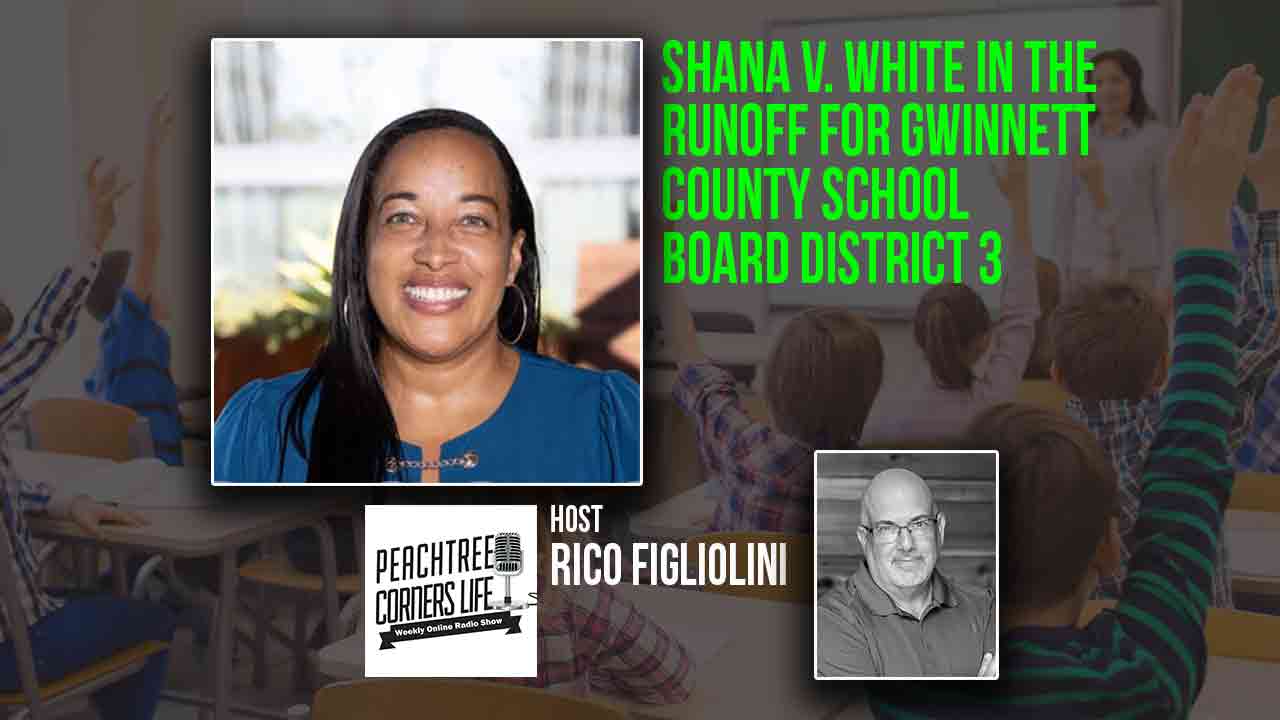
Gwinnett County School Run-off is June 18
This episode features Shana V. White, a candidate for the Gwinnett County School Board. Shana shares her background as a third-generation teacher and her passion for education, highlighting her diverse teaching experience across Metro Atlanta. The discussion emphasizes the importance of a community-based approach to education, with schools, parents, and the broader community working together.
Plus, topics such as school safety, the synergy between education and compassion, and the role of AI in the educational landscape. Don’t miss this insightful discussion on why your vote matters. With your host Rico Figliolini.
Shana’s Website: https://www.shanavwhiteforgcps.com
Timestamp:
00:00:00 – Shana White’s Run for Gwinnett School Board
00:01:39 – Teaching: A Family Legacy and Calling
00:03:19 – From Doubts to Passion: Shana’s Journey as a Teacher
00:04:29 – From Basketball Player to Coach
00:05:54 – Strengthening Schools as Community Hubs
00:09:37 – Rethinking Discipline: Teaching Accountability and Respect
00:13:23 – Importance of Consistency in School Behavior Expectations
00:16:21 – Balancing Cell Phone Use in the Classroom
00:20:50 – Transparency in District Leadership and Decision-Making
00:24:16 – Improving Accountability, Morale, and Equity in Gwinnett County Schools
00:27:57 – Bridging the Gap: Integrating Apprenticeships and AI in Education
00:31:50 – Leveraging Tech Resources to Empower Youth Entrepreneurship
00:36:30 – Importance of Critical Thinking in Early Education
Podcast Transcript
Rico Figliolini 0:00:29
Hi, everyone. This is Rico Figliolini host of Peachtree Corners Life here in the city of Peachtree Corners, Gwinnett county. And we have a good guest here, a great guest today, actually, one of two people running for Gwinnett county school board and a runoff that ends June 18. Shana White, candidate for Gwinnett County School board. Hey, Shana, how are you?
Shana White 0:00:50
Hey, how are you doing? Thank you so much for having me on. I’m excited to be here and to chat.
Rico Figliolini 0:00:54
No, it’s always good to talk about issues and things in Gwinnett county, especially things affecting, particularly Peachtree Corners, if you will. So we’re talking district three, the former seat of Mary Kay. Murphy, who’s, who was in the seat over 30 years almost, I think three decades has done a great job, I think, for this city and for the students here. And now it’s opened. And there were, I believe, five candidates that ran for that seat. You’re one of two. They made it into the final runoff.
Shana White 0:01:27
Yes. I’ve really, really thrilled, like you said, Mary Kay Murphy, I always consider her institution in itself, just with the longevity that she’s had in the position. But I was thrilled and blessed to be able to make the runoff and excited these next three weeks to gear up against my opponent, Steve Gasper.
Rico Figliolini 0:01:49
Yeah, it’s going to be tough. Run offs tend to draw a lot less of a crowd.
Shana White 0:01:55
Yeah.
Rico Figliolini 0:01:55
So it’s really about door to door campaigning and this type of stuff. So tell us a little bit about yourself, Shana. I know. I know you’re an educator. We’ve been a teacher for over 15 years, ten of them in Gwinnett county. But tell us why. Why teaching? I know that’s not always for today’s generation. That’s not always the first choice, but yeah. So tell me why, why you became a teacher and give me some background on yourself.
Shana White 0:02:20
Awesome. So I was born and raised in Atlanta. I grew up in Decatur. I went to Dunwoody High School. So I’m a product of Dekalb county schools back in the day. I still talk to my high school principal, Doctor Jenny Springer. She actually lives in Gwinnett now. She did an endorsement video for me, but I think from early in birth, I think that teachers are kind of born. It’s an innate ability. I’m a third generation teacher, so my mom was a teacher in DeKalb county, and then my grandmother was a teacher in segregated schools in New Orleans. So I think that I was kind of born to teach. I always fought it when I was a kid. I actually wanted to be a physical therapist when I went to college. I went to college at Wake Forest and my professors. The beauty of Wake Forest, besides it being an awesome school, is that it’s very small. So you get to know your professors very, very well, and my professors got to know me, and they’re just like, you just have the personality of, like, a coach or a teacher. I don’t think that you’ll do well because you’re a very empathetic person with physical therapy, because you have to put people through pain and you’re going to empathize too much, and it’s going to be hard for you to do your job well. But something where you’re working alongside people in a different capacity, where you’re helping them be successful, would be better for you. And so they encouraged me to coach at a local high school up in Winston Salem, North Carolina. And I got the bug to be like, oh, maybe I am supposed to be a teacher. I’ve been doubting this my whole career. Told my mom I’d never be a teacher like her, and here I am. As I said, I’ve been a teacher. I was a teacher for 15 years in all over metro Atlanta. I’ve taught in public and private school, also taught at Wesleyan, over in the Peachtree Corners area for a year and coached there. But most of my time I spent teaching in Gwinnett county schools. I taught at Peachtree Ridge, and I was the basketball coach there. I also taught at summer hour. I taught at Sweetwater, and I spent a bulk of my time at Creekland.
Rico Figliolini 0:04:22
Any particular subject areas that. That you taught there?
Shana White 0:04:26
Yeah. Everybody gets kind of, like, geeked out and excited at the same time. I’m one of, I think, two people that certified in the state of Georgia in health and PE, in computer science. So I self taught myself computer science. I spent most of my career teaching health and PE, but I taught computer science towards the end of my teaching time when I was in Gwinnett.
Rico Figliolini 0:04:49
Great. We’ll get a little bit towards computer science and all that in a little while.
Shana White 0:04:54
All right, awesome.
Rico Figliolini 0:04:55
But I do want to. So you. You coached basketball, you said, right? Any other sports, or is that the sport that you coach?
Shana White 0:05:02
That is. That is the sport. I played three in high school. I played soccer, basketball and softball. I was better at basketball. AAU was kind of like the beginnings of what it is now. Now it’s a complete, like, money making scheme. But AAU started shortly. When I was playing, I was really good at basketball. I was really good at soccer. I spent more time with basketball. I was a selected or invited walk on at Wake Forest. So I had scholarship offers to a lot of other schools, but I wanted to go to wake academically. I narrowed it down to Wake and Emory, and I just did not want to stay home because I was from Atlanta. I wanted to be somewhere else. And so I went to Wake as an invited walk on for the basketball team there. And I coach soccer a little bit like middle school, like rec, but basketball is the thing that I coached at the varsity level for an extended period of time.
Rico Figliolini 0:05:58
Gotcha. Probably should have asked you this before. Do you have any kids?
Shana White 0:06:02
Yes, I do. I have a daughter who just finished her freshman year at Paul Duke, and then I have a son who just finished his 6th grade year at Coleman.
Rico Figliolini 0:06:12
Wow. Okay, cool. So, students here, teacher, Gwinnett county, I’m sure through what you’re doing, through having been to varied schools, private and public, and through coaching and through subject teaching and being in Gwinnett county schools for ten years, I’m sure you’ve observed all sorts of things going on in your mind at this moment. What are the challenges facing Gwinnett county? In Gwinnett county schools, their students and their parents and teachers?
Shana White 0:06:43
I think the big thing is making sure that schools become back the heart of the community. I think the way society has kind of grown is that we’ve grown away from the fact that when we have strong schools, we have strong communities. So our cities are only as good as how strong our schools are. And I think drawing both parents and kids into a full learning experience, not just this rote memorization of, we have to get certain scores on standardized tests, reading, writing, math, they’re all very, very important. But we want kids to feel like they belong at the school, and the parents feel that their kids are safe at the school. So making those schools those kind of full on community places where kids want to be on a daily basis, where they’re not going to want to get in trouble. Like I said, I’ve dealt with many kids, kids that sometimes don’t choose the correct behaviors. But we want our schools to be a place where they can make those mistakes and not necessarily make them in a damaging way, but make them, but understand that when they do make those mistakes, there’s accountability for that, that you cannot make decisions that are going to hamper my ability to learn, my classmates ability to learn the safety of my building, the safety of my teachers, the safety of my administrators. So just having kids better understand and feel ownership at their school, that they want to be there, that they’re part of a bigger community, and that their role in that is to make that community thrive by them being a successful student and then also drawing parents in. I know that a lot of parents are taxed as far as maybe work, other family obligations, those types of things, but helping them understand that, like, the school is not necessarily taking their job, but there to support them in raising kids, that it’s a community type thing. And it’s not just one aspect, the school doing one thing or just the parents doing one thing, but working in cohesion. Because we all want what’s best for kids. And when we have kids that are thriving, our communities ultimately are going to thrive.
Rico Figliolini 0:08:42
I believe parents all want that. Right. And you’re right when you say that, you know, there’s challenges and time is being competed for in a variety of ways. And you may have, especially in this county, right, where we’re such a majority minority county, so you have a lot of non english speaking parents. Maybe both parents are working well nowadays, almost both parents are working no matter where they are in the economic scale. But, you know, it’s challenging. If you’re getting paid per hour, if you’re doing gig work or stuff like that, it’s certainly challenging. I think we all want respectability. You know, we want kids to be respectful and to understand and take responsibility. Are there specific programs or ideas that you have that you would like to see implemented that may not be there right now? Things have changed. Right. Two years ago, was it two years ago where they changed that punishment? I shouldn’t say punishment.
Shana White 0:09:39
It’s not really the discipline policy.
Rico Figliolini 0:09:41
Correct. That was changed at one point. Things happened really bad because of it, or in spite of it or whatever, and now things have moved back again. So, you know, things are done for a good reason sometimes, but even. Even for good reasons, they end up having to be changed because bad outcomes. So what do you see as something you’d like to see done?
Shana White 0:10:03
Yeah, I think a lot of times I always tell people discipline comes from the latin word, which means to teach, not punish. And we have to get in that mindset to understand that we want to teach kid what is respectable behavior. And I think having that sense of ownership of being a part of a school community, that I wouldn’t want to make this environment unsafe for me to learn in or for other people to learn in. I think the discipline policy needs to be revamped. I believe in restorative justice when it’s implemented correctly, but when it’s implemented the way that it was in Gwinnett, you get the results that happened in Gwinnett where it was not implemented thoroughly. Teachers were unsure of what their lines were, what their responsibilities were, administration, etcetera. And so when you have a policy and you don’t have the people in place to implement it and they’re not told what to do, then you get kind of a chaotic result with things. I think understanding that students need to understand that they have to have accountability for their actions is really, really important. And understanding that teachers should have a little bit of power because they are the ones that are in the classrooms with students, more often than not, to basically hold these students accountable, that it’s not something where they can’t hold students accountable for behaviors in their classroom that are not acceptable and that students are required to actually not necessarily always be punished, but they are being held accountable for their actions. So if their actions are disruptive to the learning environment, nobody can learn. So we have to make sure that that student is necessarily removed from the environment so that everybody can be successful and so that student can also be taught what behaviors are acceptable in the classroom and what we are going to allow so that everybody can have a conducive learning environment. So I believe the accountability is the big piece. And I’ll be perfectly honest, as a former teacher, a lot of times accountability is very, very hard, and people think of it as this bad word. But accountability breeds that respect that you mentioned before, because when you hold people accountable, they’re going to be respectful. And I think also having the ability to hold people accountable is something that is not necessarily given very freely as much as it should be. And some of that onus is on our families. Some of that onus is on students. Like you said, society is a lot different than when we were growing up. But at the same time, kids understand consistency and they understand accountability when it’s taught. I know in my classroom I never had discipline issues because the kids knew this is how we expect everybody to act in this classroom. This is what we’re going to do. And then these are the examples of the accountability measures that we’re going to take.
Rico Figliolini 0:12:44
No, I was going to say so. I mean, you know, kids are in high school. It’s one thing if they’re already 16, 17 years old. It’s very difficult to change behavior at a certain point. You know, we’re not talking, you know, hey, even that word of changing behavior. But if they’re being disruptive, obviously there has to be, like you said, you know, there has to be outcomes to that, right? Responsibility has to be taken. Does it make sense to change things the way they could be? Almost not revolutionary, but just look at the first four grades of school, of kids coming up through that, because they’re all coming up through the same thing usually. I mean, it’s not transient as much as they’ll be going through 12th grades, probably, in Gwinnett county, unless they move out of the county. Does it make sense to look at the first four or five grades and say, you know what? We’re going to do this different. We’re going to begin that process more endearing at those younger grades? Does that make sense?
Shana White 0:13:43
Yes, it does. And I think that that gives the onus to elementary schools to be kind of the molders of our students that are going to be coming through Gwinnett county schools. And if there is consistency, and that’s kind of where we are as Gwinnett, because we are site managed, every school’s principal is going to make individual decisions that meet the best needs of their students. But I feel like overarching across the entire county, there needs to be a consistency, especially in the elementary level, to say, these are the behaviors that we expect our students to exhibit in Gwinnett county schools, kindergarten, all the way up to 12th grade. And so they are consistently getting those things reinforced with them at early ages. So it’s not a huge culture shock when they get to get high school, and all of a sudden they’re like, wait, I was allowed to do this in fifth grade. I was allowed to do this in middle school. Now I’m not allowed to do this in high school. Whereas if that consistency is very, very key, I think that’s the one thing that we’ve lost in, Gwinnett, is we have a bit of inconsistency with how we enforce things with students. And I think when you bring consistency, kids are less confused and they’re less apt to act out when they know that things will be consistently enforced and they’ll be consistently held accountable to certain standards.
Rico Figliolini 0:14:56
Do you think social media or use of cell phones in schools contributes sometimes or exasperates bad behavior. Do you think that’s something that the school system should address?
Shana White 0:15:09
Yeah, I think phones, I think adults were just as guilty. I can’t deny the fact that I have my phone in my hand on a regular basis. And so we have to understand that our modeling of behaviors are not necessarily great for kids as well. I do think social media, especially in now, this day and age, has the implications of being harmful for kids. You see a lot of bullying, you see a lot of social media harassment that happens, those types of things. And so kids need to be better equipped to handle this powerful tool that they have in their hands to understand their implications of using these devices and understand this stuff follows you, that that digital footprint that you make in the 9th grade is going to follow you when you’re applying for college as a 12th grader or applying to just go into the workforce. So, again, going back to that consistency and letting kids know that nothing is hidden on social media, you might think that a snap picture goes away after a minute. Those types of things, everything can be found because it’s all just data. But I do think cell phones in the classroom can be a distraction. I think that they’ve gotten worse just from when I was in the classroom to now, because I think almost everybody has a cell phone. I had kids when I was even at Wesleyan that were like, in third grade, and I was like, who are you calling in third grade? What do you need a cell phone for? Type of thing. But I know that it’s a parent choice, and so you have to respect that. But finding ways to either have students, one of the things that I did in my classroom, which helped mitigate the cell phone issue, was I would have a mindfulness moment to start every class. And luckily, I was a connections teacher, so I had the students for 90 minutes because we were on block. And so I would let kids spend the first ten minutes of class doing whatever they needed to get focused on my class. So some of them chose to listen to music on their phone or text. But I said, outside of this ten minutes that I give you at the beginning of the class, the cell phones are not out the rest of the time. And I never had issues with cell phones with that because I kind of gave into that kind of addiction that a lot of people have to just be on their phone. Hey, I’m giving you ten minutes. Outside of the ten minutes is my time for us to learn in this classroom. But I do think cell phones can be a distraction in the classroom, and I think that they’ve got to be handled in so many different ways because students are reacting differently, like in how you handle it in middle school and high school. So it look different as well.
Rico Figliolini 0:17:44
For sure. And everyone want. Everyone wants an audience, I guess. And they’re all looking for views and they’re all looking for. I mean, we all. I work in the business as well, in marketing, so I get it. And it’s not an easy. It’s not an easy thing. And it’s hard to put it down. Right. You scrolling for 20 minutes, 30 minutes, and you’re realizing you’re already. God, it’s already an hour later now.
Shana White 0:18:07
Yes.
Rico Figliolini 0:18:07
And you’ve accomplished nothing.
Shana White 0:18:09
That’s exactly.
Rico Figliolini 0:18:10
So it could be crazy.
Shana White 0:18:12
It’s a nice time waster.
Rico Figliolini 0:18:13
Yes. Yes. That’s for sure. And God knows who wants to see someone, you know, like, whatever they’re doing. I mean, it’s just like. Although I find great recipes, I gotta say. But other than that.
Shana White 0:18:25
Yeah, I was gonna say I find great recipes on TikTok. That’s one of the reasons I’m on there. And we just got a puppy in our house and so lots of dog content so that we’re raising our puppy correctly because we’ve never had a pet before. That’s what I’m glad the algorithm has gotten. Just cooking and puppies on mine so I don’t see all that other wild stuff.
Rico Figliolini 0:18:44
Yeah, yeah, I was going to say. So also, I think part of what you talk about is transparency, right? One of the three main things, integrity, compassion, which pretty much we’ve gone through. But transparency, what do you mean by transparency and where do you expect that to be? How will that be helpful?
Shana White 0:19:04
Yeah, I think the big thing, even when I worked in the county and to now, is that the county is very top heavy and there’s not real clarity as far as what is happening at the top of the hierarchy in the county and how that is impacting schools. So I’ve mentioned this before in many events, like the chamber forum, all that stuff is that we’ve never really had an equity audit in Gwinnett. And the equity audit, I don’t want people to get scared by hearing the word equity, but it basically gives you an understanding of where the county stands and where the gaps are as far as needs for students and teachers with resources, with funding all these things in place. And so we’ve never had an equity audit. We have LSPI, which is a local school plan for improvement, but that’s not an equity audit. And so there’s a lot of data that we see from the county that I would say is not 100% painting a real picture. It’s painting a picture that they want people to see, like staff retention rates. I know Doctor Simmons, who’s on the board right now, posted something that she received from the county about the number of teachers that we’ve lost. And we know that teacher retention rates are actually really, really bad for Gwinnett and lower than certain areas in the state. But the data that came from the county made it and painted a picture that we had no teachers or very few teachers leaving. And so what I mean by transparency is just the transparency with the data is you can’t fix problems if you don’t really clearly know what those problems are. And so, as much as it’s allowed ethically, because I know school boards have certain tenants where they can’t breach as far as certain areas of information, but the information that should be readily available to all constituents in the county, because even people who don’t have kids in Gwinnett county schools understand Gwinnett county schools drives your property value. So if you don’t know how the schools are standing as far as certain issues, then you don’t have clarity as far as what direction Gwinnett county schools are going. And so I think the transparency, for me is just transparency in what are the goals of our leaders, the superintendent, district leadership, et cetera. What direction are you trying to take us, and what does the data say so that we can make the best decision that’s going to serve all students? Because in order for Gwinnett to be world class, it can’t just be certain schools. It’s got to be the whole district. And as you mentioned before, the district is predominantly Latin A and black right now. And so how are we making sure that we serve those schools just as well as we’re serving the schools that maybe don’t have that pronounced racial demographic added so that all schools can be good? Because you can have five schools in Gwinnett be good, but since there’s 142, those five can’t make up for the ones that are maybe not as strong as they could be, for sure.
Rico Figliolini 0:21:57
And we were talking. You’re talking transparency. So what’s peculiar to me, to some degree is that every member of the board should have access to all that data. No, they should.
Shana White 0:22:09
But they. I know numerous times, just even asking, talking to some of the Gwinnett teachers, talking to current board members, they ask for the data, and it’s not given to them or it takes months, those types of things.
Rico Figliolini 0:22:24
Freedom of information and stuff.
Shana White 0:22:26
Yes, the Freedom Free of Information act. Exactly. So it’s one of those things where it’s. They’re giving what they want to give. And the big thing for me, I think, for transparency that breeds accountability, is that when everybody has a clear picture of what everything is going on behind the scenes, and I know there’s some things that have to still stay behind the scenes, just ethically, between the school board and the superintendent. But some of these things should be clear so that everybody knows where things stand, because it is easier to hold people accountable. Because if we don’t set goals off clear transparency, then we’re just aimlessly going in any kind of direction and not going to lead to kind of this ideal of being world class, as Gwinnett has been the motto for. With doctor will bank or mister will banks in previous years.
Rico Figliolini 0:23:14
Yeah, I can appreciate the. It’s not the secrecy, but the behind the scenes stuff like you’re talking about where, you know, if they’re choosing certain properties that they have to bid on, those things make sense because those prices can. Can hike up. And I know people are worried about, well, who chooses those properties? Well, that’s what the board’s there for. If we believe in who we voted for, they should be the custodian of. Of good practice there. Right. And I can understand the discussion between the superintendent and the board needs to be in private because sometimes, you know, there’s discussions and you should not be afraid to be able to give your opinions that it’s going to get out because, you know, you’re arriving at a decision at some point. If you can’t give your honest opinion because someone’s going to talk you down and say, well, why are you saying that? You know, it doesn’t lead to open. It’s like shutting a kid down before they get to say who, you know, how they feel. So honest discussions sometimes have to be kept in private. So I appreciate what you’re saying with that, but with budgets being spent, you know, stuff that have already been voted on and knowing where the money is going, that should be all open. I mean, Kemp, Governor Kemp, just, what was it? $45,000 per school for security for each school to decide how they’re going to use it, apparently. I think, you know, some. Everyone’s going to want to know how that’s based and what each school is going to be using it for. And then the teacher raises, and I can appreciate there’s a budget for teachers. Right. But maybe there’s 30 empty slots because no one’s being hired. That money’s sitting there. Right. So there’s so much going on in a big. In a big county like this. You know, your term, I think, would be, is it two years or is it four? Four. So it gives you enough time as a candidate, if you win, to be able to go in there. So in your first year, then what are the two important things that you’d want to make sure gets done in your mind?
Shana White 0:25:25
Yeah, I think the first thing, and I’ve mentioned this before, is just the accountability of the superintendent. Right now, I don’t feel he’s being held accountable to a standard that needs to be for what we expect for Gwinnett county schools. People have mentioned before certain data points like our graduation rates going down, all those types of things that we see metric wise with student achievement. But ultimately, all of that falls on the operations. And the person who the buck stops with the operations is the superintendent. And so for me, the one thing is I would love to see, hopefully, behind that black curtain, all of this real data that maybe can’t publicly be out there and sit there and look at, did he meet the goals that he was supposed to for what he was hired to do? And I feel like those are yes or no questions. I don’t feel like they’re a maybe or an iffy. They’re just kind of like, we look at the data and then we sit there and say, did he do this? Did he do this? Did he do this? Or did he not do this? So I’d say the superintendent is the first thing and kind of clearing up, because I feel like there’s. I don’t say confusion, but there, within that hierarchy, there’s been a lot of turnover. And with that, you lose some of the camaraderie of the staff. You lose some of the, like, belief of the staff in the system being successful for them. And so finding a way to rebuild staff morale as well is a big thing for me. As a former teacher, I know what it’s like to be in a Gwinnett county classroom, and I know how hard that job is. And finding ways to build staff morale back up would be another big thing, because I hate that we keep losing really great teachers. I know a lot of teachers nationwide are just leaving education as it is because for some of us, it’s not sustainable, sustainable, but ultimately building staff morale back up. And then I would say the last big thing is some sort of audit where we’re looking at, what are we doing at every one of the schools in Gwinnett county? And how can we make sure that every gap is filled so that every school has what they need to be successful?
Rico Figliolini 0:27:31
When we talk about schools like Paul Duke, for example, or even Gwinnett was a science, math, the specialty schools, if you will, to integrate. Although Paul Duke is named a STEM school, it’s also a hybrid educational school, right? Because some kids that normally would not, let’s say, be looking at STEM is being taught in an alternative manner that best suits them. That’s what that school essentially does. There’s technology that’s out there, right? We talked just a touch before about AI, before the podcast. AI is being used consistently now throughout a variety of companies out there. Probably every company out there is using AI to some sort of degree, whether it’s writing a copy for a website for a small company, or it’s creating bots, or it’s, you know, to do certain finite tasks. How does the school system, how do you feel the school system can address, first kids that don’t want to go to higher level education? That’s probably even a misnomer, really, to do more advanced education. And they would prefer leaving high school knowing that they can do something, whether it’s cad programming or 3d printing or welding. I mean, we don’t even have that type of stuff in the Gwinnett county schools. I hate to say this, but when I grew up, yes, printing, print shops, metal shops, all that, right? So a lot of my friends from high school would go on to auto mechanics schools and stuff. I see that happening now. I see kids being. Don’t want to go do other things they want to do. That AI coming into the mix over the next five years now may change a lot of those jobs. Will change a lot of those jobs, especially manufacturing and warehousing and all sorts of things like that. Where do you find, what do you think needs to be done for kids that want to leave high school and go straight to work? And part two, I guess, because AI is really part of that. Right? And how AI can be used in schools.
Shana White 0:29:45
Absolutely. I’m a big, big proponent of any part of the organization that I work with now. We work with apprenticeships for students, so we pick that gap between 16 and 24 for the kids who don’t want to go to college, but they do want to maybe pursue something in computing, computer science, AI, those types of things, with setting them up with organizations. And I think that that should be kind of a through line without all Gwinnett county high schools, not just the specialty schools, the Paul Dukes, the math and science school. I know Schessinger is an AI school, but basically allowing just kind of this apprenticeship internship model. I know we have work based learning already in schools. I know for some kids who do want to maybe start the higher ed thing, there’s the dual enrollment piece as well. But I think some sort of apprenticeship program for those students who maybe want to go into welding, who want to be an electrician, carpenter, those types of things, and connect them with people in Gwinnett county, because we have so many businesses that are doing some of the things that our kids are interested in, how can we develop some sort of apprenticeship program for them so that they can be an apprentice during the summer or during the school year and not necessarily get like a full salary as a work based learning type of thing, but it be a work based learning environment where they’re still getting a stipend to learn something as a skill that they want to pursue post high school. I think that that’s really, really important that we build.
Rico Figliolini 0:31:18
Okay. Do you think. Do you think that school system should not. Should be working holistically? Maybe. Maybe with the chamber of commerce, maybe with other, you know, I mean, integrating all that versus trying to be siloed.
Shana White 0:31:33
And trying to come up with. I totally. I totally believe that we should be thinking of everything as a big picture, rather than just, you take chemistry, you take physics, you like this pattern that we go. And all that standardization comes because of standardized tests. That’s why everybody has to go through the exact same system, because everybody’s got to take certain benchmark tests in certain grades. But I think thinking of it holistically, I know the curiosity lab that’s down in Peachtree Corners is another place that I feel is underutilized by Gwinnett county to connect, empower up kids to be able to go and work with tech individuals, maybe tech entrepreneurs, to figure out, maybe I’m an entrepreneur, and that’s something I want to pursue rather than higher ed. I think that that definitely is an untapped area. And I think looking at kids holistically and not literally putting them in boxes as we do right now, education is really important. And for the answer to the AI piece, AI is everywhere. I tell people all the time in my work, AI has been around since the sixties, so don’t let people tell you that it hasn’t been. It’s been around for a really long time. But I know that it’s full of the buzz right now, and AI is changing a lot of things. But the really big thing that I want to impress upon with people is understanding not only how AI works, but how AI utilizes everybody’s data to make it go. Because AI, if it doesn’t have data, it doesn’t go. And so it’s getting data from somewhere. In most cases, it’s screwed, scraping the web to get the data, but understanding that we have the power to withhold our personal data, our communities data to keep that safe from this AI machine. And I think that’s really, really important. AI is of course going to transform education. I think we need to pump the brakes a little bit on that in the sense of making sure kids understand the ethical implications of AI when we’re talking about it. But at the same time, I do think AI is an important part of education because I work still in computer science education, which I feel is essential for all students to have some sort of digital understanding of this technology world and be able to navigate it, because there’s no, no career that you’re going to have to do that. You’re not going to use a computer. And so kids understand that, not just being able to type on, you know, your keyboard for your phone, but some kids don’t even know how to type on a keyboard. Like I remember I had keyboard that doesn’t exist. I watch my own two kids when they’re sitting there typing reports and they’re one finger pegging and I’m sitting there, I’m just like, okay, this is so much easier if you actually learn how to type that type of stuff. But like you mentioned before, the wood shop and like the home Ec, those other types of skills, I wish we would go back to more of a holistic thing to give kids more variety so they can just see that there are certain areas that they might be interested in that are not just pigeonholed into the math, into the science, into the Ela.
Rico Figliolini 0:34:36
Funny, because I talk about my experience, but at an age where I’m talking about like four or five decades back. But my 29 year old tells me, just told me the other day, literally, about pecking keyboards. He’s like, I have these college kids that are coming for internships for the summer, and he says they don’t know how to type. Never mind. They can’t read cursive, which is fine, they teach, which almost doesn’t make sense in the sense that they still want a signature, which is in cursive, I guess, right? These kids can read cursive, they can’t type. They’re doing, he said they’re doing two, maybe four fingers, and it’s just, it bothers him. And he’s 29 years old. He’s not, he’s not like an old guy here, but he went through the IB program, too. So the other thing that he worries about is that he’s looking at writing, and these kids can’t write. We’re talking about college. Third year student, you know, can’t write a cohesive piece of work. And he says, and they have Grammarly on the computer and they still can’t get it together. So it’s a sad state of affairs to some degree. I mean, unless you’re, you know, a higher level student, it seems like more of these students are not coming out unless they go through an IP program of a sort where it’s a bit more rigorous. There’s a lot more writing in that. Well, at least when he went through, I don’t know if it’s changed or not.
Shana White 0:36:01
Yeah, yeah, that, and also a lot of the reading is a big part of it. To be a good writer, you have to want to read.
Rico Figliolini 0:36:10
Right.
Shana White 0:36:11
I would say there’s a lot of adults that don’t read, and even just to read for information, not to just take something for face value and critically think is really important. And so we’re just in this mindset just with education, where we teach to test and just try to prepare kids for tests rather than prepare them to actually be like engaged citizens in the world, to be able to read text, to interpret it, understand it, and then formulate an idea or ask questions. That’s the big thing I always push in my class, and something I still do to this day is I always ask why? What is the intent? What is the motivation, those critical thinking thoughts, rather than just taking something at face value and saying, okay, I’ll just go with this.
Rico Figliolini 0:36:51
Yeah, I agree with what you were saying before, and I think we agreed on, both of us, that the first five grades are the important part, and not only in teaching respect and responsibility, but the other, the other approaches to subjects as a whole. Right. With, with each other. Because really, the grades go into, to me, that doesn’t make sense. I mean, middle school, I can understand the way you want to test at that point. That’s fine because you’re going to high school and you have to be testing against other students across the country. But from elementary school, those five first years just seem to be such an investment that if we had done that or if we do that, it will set the stage for the rest of their life. We’ve come to a point where I think that I think everyone would like to be able to know where they can find out more information from you, Shana. So tell me.
Shana White 0:37:53
Awesome. So my website is shanavwhite4gcps.com. I’m also on Facebook and Instagram as well, @voteshanavwhite and would love to converse with you. A lot of times I’ve learned in this short time running for office I get comments on Facebook and I actually respond. So feel free to reach out. I will respond. I’m not one of those people who just posts and doesn’t pay attention. If you have any questions, feel free to reach out on my website or on Facebook or social media. I’ll be more than happy to answer any questions you might have.
Rico Figliolini 0:38:32
Next one so June 18 is a runoff date and give us a 1 minute thing about asking for that vote.
Shana White 0:38:40
Awesome. Once again, I’m Shana V. White. I’m running for district three school board. I’m the only candidate who has Gwinnett county teaching experience for ten years. I think that educational experience matters. I’m also a national expert on computer science and AI and then a national advocate for public schools. I want to get Gwinnett county back to where it should be, which is an elite level county of public schools where all students are thriving, all teachers are being successfully encouraged in the classroom and want to be there and that where everybody feels safe and included in the classroom. Rebuilding Gwinnett county schools to be those community anchors to make our entire county thrive.
Rico Figliolini 0:39:24
Excellent. Thank you Shana everyone. Check out her website. Leave your comments below. Depending where you’re watching this or if you’re doing listening to a podcast on Spotify or iHeart. Certainly just email us or come to our Facebook page or YouTube channel where this is streaming and make your comments there. Shana, hang in there for a second. But thank you everyone else, I appreciate you joining us. Share this with your friends. Again, the runoff is June 18. There is early voting, so check Shana’s website or with her or the county’s website and you can find out more information about dates and such. But thank you again for being with us.
Related
Read the Digital Edition
Subscribe
Keep Up With Peachtree Corners News
Join our mailing list to receive the latest news and updates from our team.
You have Successfully Subscribed!

What’s going on at Jones Bridge Park and the Challenges of Urban Development

Taste of Peachtree Corners: PCBA Showcases Local Restaurants

The Forum Gives Sneak Peek of New Eateries and Community Spaces

Southwest Gwinnett Mayors Share Visions for the Future

8 Events Happening In and Around Peachtree Corners This August

Peachtree Corners Shines Bright with Light Up the Corners Glow Race this August

Peachtree Corners Shines Bright with Light Up the Corners Glow Race this August

The Forum Gives Sneak Peek of New Eateries and Community Spaces

8 Events Happening In and Around Peachtree Corners This August

Southwest Gwinnett Mayors Share Visions for the Future

Taste of Peachtree Corners: PCBA Showcases Local Restaurants

What’s going on at Jones Bridge Park and the Challenges of Urban Development

Local Resident Opens AtWork Location in Peachtree Corners

CHRIS 180 Expands its Services into Gwinnett County [Podcast]

Light up the Corners [Video]

Capitalist Sage: Business Leadership in Your Community [Podcast]

Cliff Bramble: A Culinary Adventure through Italy

Top 10 Brunch Places in Gwinnett County

A Hunger for Hospitality

THE CORNERS EPISODE 3 – BLAXICAN PART 1

Top 10 Indoor Things To Do This Winter

The ED Hour: What it takes to Remove Barriers from Education
Peachtree Corners Life
Topics and Categories
Trending
-
Business1 week ago
Taste of Peachtree Corners: PCBA Showcases Local Restaurants
-
Business2 days ago
The Forum Gives Sneak Peek of New Eateries and Community Spaces
-
City Government4 days ago
Southwest Gwinnett Mayors Share Visions for the Future
-
Around Atlanta4 days ago
8 Events Happening In and Around Peachtree Corners This August


